
- Autism Podcast Series
- Late Talkers Podcast Series
- Let’s Talk About Talking Podcast Series
- Toddler Articulation Podcast Series
- The Language Milestones Series
- The Stages of Play Series
- All ASHA CEU Credit Bundles
- About Laura Mize
- Teach Me To Talk Testimonials
- ASHA CE Credit on DVD
- Favorite Emails
- Intelligibility
- Sign Language
- Therapy Tip of the Week
- Professionals
- The Apraxia Workbook
- The Autism Workbook
- Let’s Talk About Talking
- Teach Me To Talk: The Therapy Manual
- Building Verbal Imitation Skills in Toddlers
- FUNctional Phonology
- Teach Me To Play WITH You
- Entire Collection PLUS
- Therapy Manual Combo Pack SPECIAL
- Entire Collection from Teach Me To Talk
- Therapy Manual Combo Pack PLUS
- Both Apraxia and Talk DVDs – 3 DVD Set
- 3 DVD Set Teach Me To Talk + Listen and Obey
- 5 DVD Set – Teach Me To Talk DVD Collection
- Helping Toddlers with Autism Set
- Helping Toddlers with Autism Comprehensive Package
- Helping Toddlers with Significant Delays Package
- Is It Autism? Recognizing and Treating Toddlers with ASD – 1 & 2 Set
- PLAY Package
- Teach Me To Talk The DVD and Therapy Manual
- All CEU Courses
- Building Verbal Imitation in Late Talkers Podcast Series
- Speech Language Therapy Videos
- Privacy and Terms

Best Books for Speech Therapy for Toddlers

In my week of making lists, I wanted to add a post with recommendations for the best books for speech therapy for toddlers.
If you need specific therapy ideas, I’ve devoted 3 entire podcasts to this topic and you can find those here:
Making Books Better Part 1 , Part 2 , Part 3
Here’s the list of books — along with potential goals to help you plan how to use the books to target language skills in toddlers with language delays.
Please keep in mind that many of the books I’m including are picture books meaning there’s no storyline, but the pictures are engaging and perfect for building a busy toddler’s attention, sharing an experience together (to target joint attention), learning how to link meaning with words, and finally, naming pictures. Some books are listed under multiple goals — which is even better! I’ve included a few more books that I love and use mostly for “just reading” to help a child learn to listen to a whole story at the bottom of the list.
This information is discussed in detail in podcast #415 .
Demonstrate awareness and enjoyment of books measured by attending/listening with joint attention, not mouthing book immediately, righting the picture, and turning pages.
Little Blue Truck
See Touch Feel Books by Roger Priddy
Point at pictures for awareness (not accuracy – that’s coming up!)
Bright Baby Board Books by Roger Priddy
To teach pointing…
Introduce sliding books for kids who need practice isolating their index fingers to point.
For more specific strategies for helping children learn to point, watch this video.
Slide and Find
Cheerios books – to target pincer grasp
Complete simple actions with books.
Watch the show for more specific ideas, but in this phase, you’re modeling an action for a child to imitate such as kissing a baby, patting a puppy, knocking on a door, etc.
Roger Priddy Bright Baby
Follow the directions in the book for imitating actions:
Pat the Bunny
Repeat One Action for the Entire Book
Never Feed a Shark
Modify Books like Moo Baa La La La
Song-Themed Books
5 Little Monkeys
To teach a child to imitate using Peer Modeling:
Shake a Leg
Identify familiar pictures on request.
(We’ll do much more about targeting receptive language with books in the next developmental range in show #416!)
Bright Baby Board Books
In my podcast #416 Making Books Better for Toddlers with Language Delays Part Two, I demonstrated strategies for the following goals with specific books for speech therapy sessions and recommend to parents. Here’s that list for you. For detailed instructions for using these books to meet the following 6 early literacy goals for kids with language delays who are in the 18 to 36 month developmental period, please watch show #416 !
Goal #1… Identify familiar pictures on request.
A child will point to the picture you name as you say, “Show me the ___,” “Where’s the ____?” “Find the ____.” or “I see the ___. You find the ____.”
Begin with simple picture books and when a child is ready, increase your complexity. (more about that in show #417!)
Roger Priddy Books
Here’s the book I use for making “sets” of objects to match with pictures. See details in show # 416 .
Not the same book sound book as I used in the podcast, but very similar:
Goal 2: Match pictures to objects
Select a book with familiar objects and find an object (try for one per page) so that the child can match the object to the picture.
Goal 1: Child will imitate play sounds and exclamatory words while reading books.
Goal 2: Child will imitate familiar words during verbal routines using books.
Goal 6: Child will name pictures.
Select counting books with familiar words and instead of counting the objects name them sequentially. For example, on a page of 3 dogs, you’ll say, “Dog. Dog… (expectant waiting for the child to fill in “dog.”)
In my podcast #417 Making Books Better for Late Talking Toddlers (18 to 36 months), I demonstrated strategies for the following goals with specific books I use in therapy sessions and recommend to parents. Here’s that list for you. For detailed instructions for using these books to meet the following 6 early literacy goals for kids with language delays who are in the 18 to 36 month developmental period, please watch show #417.
Previous books lists for 415 (part 1 of this series) and 416 (part 2 of this series)
- Identify pictures of familiar actions or verbs.
Open the Barn Door
Mrs. Wishy Washy
Maisy Goes to Preschool
What Are They Doing?
First 100 Words
2. Identify pictures of first location words or prepositions.
3. Find 2 pictures on request as a prequisite for following two-part commands.
Troubleshooting Ideas:
ACTIVE BOOK – younger – Eric Carle
Make any book active just by giving a job on every page
Design activities around personal preferences to help with attention/participation/and general listening.
4. Identify objects by function.
5 Little Monkeys Jumping on the Bed
5. Answer yes/no questions
6. Teach negation “not”
GREAT BOOKS TO HELP BUILD A CHILD’S ABILITY TO LISTEN TO AN ENTIRE STORY!
Sign Up for your Free Book

Subscribe to the Podcast in iTunes

Browse Products
Featured Product

Recent Posts
Stage 8 Toy List for Early Roles and Pretending with Peers from Stages of Play for Toddlers and Preschoolers with Language Delays
Stage 7 toy list for new jobs and new events from stages of play for toddlers and preschoolers with language delays, stage 6 toy list for expanding play routines, stage 5 toy list, stage 4… early symbolic play toy list, happy therapists, teachers, parents & children.
"Hello Miss Laura, First, I would like to thank you for all you do for us moms who are lacking support in the autism community, and thank you for providing tons of information and resources to help our bright children. I myself benefited so much from watching your videos and reading your daily emails. I cannot stress enough how much all this information helped my toddler. Of course, getting an autism diagnosis for your child is extremely scary (she was diagnosed at 2 years old) and I was depressed and did not know what autism was, how it affected children, and how to teach children struggling with this condition. However, your videos helped me to find light in my child and now I am your biggest fan! I rewatch your videos over and over again to make sure I didn't miss anything that can help my daughter. I even purchase two books- Autism workbook and Teach me to Play. My toddler was completely non-verbal, she didn't know how to imitate, no eye contact, no pointing.. you name it she didn't have any skills and I didn't know how to teach her! And that is until I discover ed You- my toddlers (Fairy: smiling_face_with_3_hearts:)!
Now she is little sweet 2.5 years old and she says "mama" (I cried when she said that magic word), she waves bye bye or hi, she points, she gives "high 5", her joint attention is great and overall she is doing so much better! And that's all because I have been doing everything you described in your books and videos! I. My mind I always play "repetition, repetition and repetition", teaching her everything through play that she so much enjoys!!! I can write forever explaining how much I taught her through yr videos and books! And the most amazing thing is that her speech therapist is a big fan of yours as well so it worked out perfectly since we understand each other and work based on your teachings! The therapist even owns the same books I own ...I am so grateful that my toddler has such an amazing therapist; especially the one that understands autism and is ready for a real challenge! God bless you for all you do and I cannot wait for my toddler blossom.. you gave me hope and lit the light inside me. And I'm determined to work with my girl :)"
"Dear Laura Mize and Team,
Thank you so much for all your hard work and publishing books! Our 17-month-old toddler suddenly exploded into speaking and imitating everybody's gestures and sounds, just a week or two after we 'completed' all activities that are listed under 11 pre-linguistic skills! Your method really works!"
Grateful customer.
I absolutely LOVE all of your workbooks, especially your Autism Workbook. Starting with Social Games has been a game changer for many of my littles with ASD and their families. It's been the best way for them to finally connect and sustain shared attention and engagement, leading to longer social interactions, through play!"
Jodie, Dev, Therapist
"Hi Ms. Laura,
Thank you so much for the videos you have posted on your youtube channel. They are so direct, informative, and helpful. Thank you for being a resource for me to become a better therapist."
"Hi Laura - I just wanted to say I received my copies of the Apraxia workbooks yesterday and I LOVED workbook 1 (not ready for 2). I'm on chapter 8 and going through the questions carefully so I'm prepared to help my son. I knew it was a great book when you acknowledged the fact that sometimes therapists and doctors don't bring a positive and supportive vibe when diagnosing. I remember being terrified at the mention of apraxia and ASD by both because they had these very concerned looks and made it seem like it was a death sentence. I know now (in LARGE PART, THANKS TO YOU AND YOUR VIDEOS) that it doesn't have to be!! I see a future for him now. You SINGLE-HANDEDLY, through your books and videos have empowered me to help my son after the doctors and therapists have gone home. You've given me strategies, play ideas, plans on how to keep moving forward. I don't always do things right, but I know I'm on the right track and I love that I can reference, and re-reference your books to help me keep going. As I was reading the book, I was so proud of myself because I've used strategies from your previous books and it felt good because I could check off a lot of the skills that you discuss. So, thank you for all your previous books as well!!"
"Gosh, I love all of your emails/podcast/website, just everything!! I work in early intervention as a behavior analyst and am learning so much from you!"
I love your work! I am a professor of early childhood special education and a speech language pathologist! I have worked to help children learn to communicate and I know how valuable the information you share is for both early interventionists and pediatric speech language pathologists!
Thank you for systematically organizing and explaining essential steps for young children to learn and develop. You are having a great impact on our profession, the ECE profession and families!"
"Thank you. If this is Laura herself reading this email let me take this opportunity to thank you from the bottom of my heart for all that you have put forth for us professionals. I own every manual (except the autism manual) and have watched every course on DVD. I have listened to countless podcasts. All of what I’ve come to be as an Early Intervention speech therapist was absolutely to your credit. With your resources at my side I have never needed to scramble for answers and strategies and above all the clear language I use when communicating with parents. My fun, animated affect and key phrases I use have been learned through watching your example. So….thank you! May you be blessed." Chaya
"I just wanted to thank you so much for your incredible help! You are so kind and lovely and every time I implement something you've taught in your manuals or videos it is always a success, I cannot thank you enough. I really appreciate how specific you are in giving us examples of wording to use and how to use a toy in therapy with your videos, it is exactly what I need to properly help my little students. I also really appreciate your list of books of list of toys. I have seen my little students make significant progress thanks to you. I'm looking forward to watching more of your videos, taking more of your CEU's, and reading more of your materials. From the bottom of my heart: thank you so much again!!"
"Dear Laura,
What an inspiration!
Thank you for helping me be a better Developmental Therapist. I often listen to your podcasts which help me help families.
Your enthusiasm, professionalism and the sheer volume of information is so great.
You are part of my team.
I just wanted you to know I appreciate you."
Thank you for your generosity in sharing so much knowledge in such a clear and enthusiastic way.
As a retired audiologist with a fabulous and language delayed grandson, I used your podcasts and outstanding publication, The Autism Workbook, to inspire and guide me over the past year.
It works!! He went from barely verbal, no gestures, didn't respond to his name etc etc to a verbal, social, curious, ready to imitate anything, fill in the blanks on familiar "set" speech, generate his own totally appropriate and mostly understandable sentences...not just short phrases anymore... full little paragraphs...about imaginary things, what he did during the day, what he wants. True communication!
You make a powerful difference in this world! ❤"
"Laura Mize, you are a Godsend. I don’t know how one human can have so many helpful things to say in a beautifully organized way, so often. Always amazes me when another super helpful email comes from you, and for free. With free YouTube videos and cheap CEUs. THANK YOU!!!"
Sheila, Canada
"I purchased the book on autism and have watched the #400s series podcasts. Laura Mize has been more effective in teaching autistic tendencies, than many professors, shadowing professions, and the 100s of books, articles and classes or videos, or live workshop speakers, have been at teaching effective practices for a child with ASD. Some of the many lessons she has taught, which I will now use, to be a more effective Interventionist, include but are not limited to: red flags, typical behaviors, self-stimulating behaviors, not taking away toys, rather showing child to play with toy appropriately. She gives examples of child's actions, "inappropriate," explains the reason for: why the child is engaging in these behaviors and how they can be replaced with more appropriate, effective fuctional and age-appropriate skills."
"I’m sure Laura gets these messages all the time, but I thought I’d share. I stumbled across Laura‘s "Autism or Speech Delay?" YouTube video when I really needed it. This video finally listed and explained some of the red flags my son was showing for autism. I share the link anytime a parent is questioning in my FB autism group. This mother I don’t even know said Laura's video changed her life. I know exactly how she feels because It changed families too. Thank you to everyone at Teach Me To Talk."
"Good Morning Laura, I received your book (The Autism Workbook) yesterday and it is absolutely amazing! As I evaluate young children (0-3) for developmental delays and write plans for them with their parents, there are a ton of ideas that are ready to use. Others that reinforce what I have been doing, and saying, all along. Thank you so, so much for writing this incredible book and pulling everything together in one place!"
FRANCINE IN MICHIGAN
"Thank you very much for sharing your knowledge, experience, and guidance. I’m a parent who bought the autism workbook and it’s the only clear resource I found to make a change in my son. I’m really thankful to Ms. Laura for helping out people like us all over the world."
"Laura Mize, all I have to say is that ALL YOUR STRATEGIES WORK."
ANNE, YouTube viewer
"We have 7 SLPs in our preschool (public) program for special needs children (ages 3-5) and we use your courses, books, and techniques every day! :-) We have seen our preschoolers make such great gains!"
"I just received Teach Me to Play With You, and it is ALREADY WORKING! WOW!
Girl…my son is 3 years old, and he NEVER asks for something using words. We were playing “Get Your Belly” (from Teach Me to Play WITH You), and after several times, he laughed and screamed "BEWIEEE!!!" It was a hoot. And I can't believe he said it! I have played with him like this before, but this time I took your advice and acted CRAZY!! I will act like a total lunatic if it will get him to talk to me! Now I can give him "the look" from across the room, and he will say it. That manual is so amazingly practical, and it is a GODSEND right now! Thank you SO MUCH!”
" I wanted to send you a quick email to say thank you. I started watching your videos/podcasts about 4 months ago. My son has gone from losing words he previously used, only having about 7 words at his 2 year check up in August (assessed at a blended 10 month language level) -- to now having so many words, increased social engagement, following commands, spontaneously requesting things, and naming letters & numbers (not in order) as well as colors. We had our monthly meeting with our SLP through the state infants & toddlers program and it felt like we were just bragging the whole time, but I knew in the back of my head it was because I have been using strategies you taught me. We still have so much work to do with our sweet boy, but I know in my heart he would not have succeeded without the education you provided. I will continue to read your emails & watch videos as we go along this journey and face challenges, but credit is due to you, Laura. Thank you so much, endlessly."
"I just want to tell how fortunate I feel to have found your website and you!! I became a special instructor in EI almost a year ago and I started with hardly any applicable training. I felt so lost and confused as how to help the kids I work with learn how to use words and play. Honestly, I didn't even understand the importance of play, although I always played with my kids. But, once I started to watch your podcasts and get some of your manuals I felt a weight had been lifted off my shoulders and that I could finally teach these kids and their families something of value from a real therapist and based on research!. Thank you so much for seeing the need to help other EI service providers and providing a forum to share your knowledge and years of valuable experience. I'm sure you get a lot of these emails every week if not every day, but I wanted to make I could add to those notes of gratitude!! THANK YOU again!!"
"Just wanted to say a HUGE thank you for these emails and your books, I have them all and they have seriously saved and improved my sessions with my kiddos. Huge thank you."
"I was very frustrated with how speech therapy was going for my child. I would take him and drop him off and not hear much of anything from his therapist and teachers other than, "He had a good (or a bad!) day." Your materials were invaluable for us because I learned how to work with him on his speech. I learned how to teach him to talk and play. I learned how to pay attention to his cues and work with him to teach him to communicate. Without it, I have no doubt he still wouldn’t talk."
"Hi! I just wanted to say (from an SLT perspective) how incredibly useful I am finding absolutely all of your articles, blogs and resources - I only discovered your site last month and have just received all your books which I feel I am learning more than on my entire university training course!! But also the way in which you give specific, realistic, fun, encouraging ideas for working with parents is really just fantastic, I only wish I have your site sooner! Thanks so much from the UK! Kind regards."
"I just wanted to reach out to say thank you for making things a little easier to manage for me this year. I made the transition from school SLP to private therapist about a year ago. While the change was welcome, it was a lot, and I was just getting my footing in the clinic when I began teletherapy full time. Your website has been a huge lifeline in helping me work with late talkers and coach their parents in an accessible but effective way, even remotely. I look forward to getting your emails each week. I am floored by the amount of valuable, free information that your website provides, and I’m looking forward to investing in your workbooks soon. A sincere thank you for all you do!"
"You are an inspiration! I am truly grateful for the way you put into words and writing how to do what we do as SLPs. At this time in my 13 years of practicing, I find your encouragement keeps me going. As a single mom, I find it a stretch to buy materials these days and I am so thankful for the freebies you so generously share that help me teach my families. I don’t have much time to put together lists or quick references for parents!! Much gratitude!!"
Laura thank you so much. Btw, you have transformed my therapy- I have become such a competent and strong therapist after watching probably like 350 of your videos and podcasts over the past few years. And I am a seasoned therapist with almost 25 years experience. (Yes prob 350 episodes ha!) But there was still a lot I learned from you. I have such a thorough understanding of birth to 3 development and how to properly incorporate appropriate therapeutic goals, techniques and strategies now, thanks to you. Kelly
Hi Laura, I want to thank you so much for the resources you provide, my daughter has delayed speech and though she qualifies for CDS. Honestly the most progress she has made in her speech/language development has been after I implemented your 5 top strategies for delayed talkers! She is now almost 2.5 and her vocabulary is well over 75 (I haven’t counted recently, could be over 100) words when at 2 she barely had four words. Honestly the last few months have been a transformation for her.

100+ Children’s Books for Speech Language Development

100+ Children’s Books for Speech-Language Development
Categorized by target sounds.
Reading to your child is so important, especially if your child has a speech or language disorder. Reading aloud to your child will activate their imagination, expand their understanding of the world around them and help them develop their expressive (talking) and receptive (listening / understanding) language skills. Your child’s brain is developing each and every day from birth, so start reading to your children daily, right away.
Need help finding a book? The speech and language pathologists at Kidmunicate have compiled a growing list of 100+ Children’s books for speech language development. We arranged the list based on sounds. So if your pre-schooler or school age child is having a problem producing a particular sound then choose a book from that sound category and emphasize the sound. It’s important to note that a child practicing a sound incorrectly can be counterproductive. It’s always a good idea to work with a pediatric speech pathologist first. A good pediatric speech pathologist will teach your child how to produce the sound correctly and will also show you how to coach your child.
We also assembled a list of books that build a child’s vocabulary. We have arranged a list of books for animals, clothing, body parts, counting, colors, food, and prepositions. Check them out below.
Here are some tips for reading children’s books for speech-language development:
Tips for reading to infants and toddlers
- Read to your child daily because his or her brain is developing every day.
- It’s ok to read your child’s favorite book over and over again. The repetition will help, but continue to expose them to other great books.
- Chose books with rhymes.
- Choose books with a wide variety of vocabulary words. (Animals, colors, body parts, clothing, numbers, etc.)
- Build up their reading time tolerance. Start with shorter sessions and continually add time.
- Point to and talk about the pictures.
- Ask your child questions. Where is the dog?
- Read the story and then pause to let them fill in the words. Use real objects like plastic animals, cars or food to allow your child to see, hear and feel the objects you are reading about.
- Relate the story to them if you can. The bear is a baby just like you.
- For toddlers, follow the words spoken with your finger to connect the words with the sounds.
Tips for reading to pre-schoolers and school children
- Read to your child daily. Again his or her brain is developing every day.
- Read books that are on their reading level.
- Emphasize sounds or syllables that your child may be struggling with. We have listed the books by sounds to help you find some great books to use to practice particular sounds.
- Ask your child questions about the sounds. What sound does baby? – Pointing to it to start. What other words start with a /b/ sound?
- Relate the story to them if you can.
- Encourage them to read as much as they can. When they get tired, you can pick up where they left off.
- It is still a good idea to read to them often even after they know how to read.
- Read the story and then pause to let them fill in the words. (Emphasize trouble sounds)
- Use real objects like plastic animals, cars, or food to allow your child to see, hear, and feel the objects you are reading about.
- If you have both an infant or toddler and a school-age kid, it’s ok to read to different stages at the same time because children love stories. Read a book for the school-age child, then have the school-age child help you read a book for the infant or toddler.
The children’s books for speech-language development listed below are linked to Amazon. Full disclosure, if you purchase a book through our site we receive a small commission that we use to run the site and create more content. Thank you for supporting our site with your purchases.
One Comment
Thank you for this wonderful list!
I’ve created a FREE eBook that is perfect for October. It is targeting the “g” sound but all of my K-2 students seem to love it. I hope you’ll check it out and pass along the word: https://www.amazon.com/Ghostly-Night-Jeanette-Stickel-ebook/dp/B01MCSV4KE/ref=sr_1_2?ie=UTF8&qid=1476444928&sr=8-2&keywords=jeanette+stickel
Leave A Comment Cancel reply
- Could your child benefit from our services?
- Take our FREE quiz to find out!

10 Books for Children with Speech Delays With Pro Tips from a Pediatric SLP!
- December 26, 2020
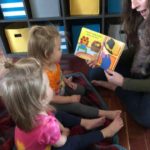
Books have been an essential part of our therapy sessions for years! Young children’s books often have a rhyme or rhythm like a song that catches their attention. It is only when we catch our little one’s attention that learning takes place! Some of these books are repetitious with predictable phrases, making it easier to remember the words so that they can eventually “read” the book to you. These books often lend themselves to performing actions, which is also key to catching the child’s attention so that they enjoy what they’re doing, have success doing it, and ultimately do it again and again!
Keep in mind that children like to be played with and entertained. It is important that as you read these books, you are animated with your voice and facial expressions. After all, books can be fun!
Here are 10 favorite books that we like to use with our little friends & tips for how they can be used in therapy and at home:
Blue Hat, Green Hat by Sandra Boynton: This book has basic colors & common clothes labels (e.g., shoes, hat, shirt) that are referred to throughout the book. These two words (color word + clothing item) promote two word utterances over and over. At the end of each page the word “oops!” is used ( Pro Tip : substitute the word “uh-oh” as this is often more prevalent in a child’s early vocabulary). Use facial expressions and dramatic inflections in your voice to keep the child’s attention and keep a rhythm as you read the book.
Brown Bear, Brown Bear, What Do You See? by Bill Martin Jr/Eric Carle: Love this one so much! And there are several different forms—slide flap board book, board book, hard back. See the photo below for an idea adapted specifically for children that have a hard time attending. As you can see, we simply color copied & laminated part of the picture so that the child could interact with the book as we are reading. In addition, we added a color icon for each corresponding page so that it lends itself to producing two word phrases for those children that are at that level. With this adaptation, you can work on skills such as matching, identifying, and labeling. This book format has also been duplicated by teachers and therapists on sites such as Pinterest or Teachers Pay Teachers that can be printed and laminated for your use (White Ghost, White Ghost, What Do You See?; Santa Santa, What Do You See?; Pumpkin, Pumpkin, What Do You See?).
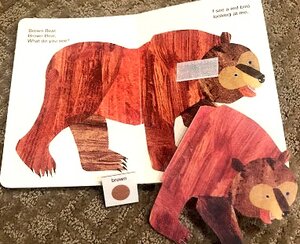
My Nose, My Toes and Me! by Frida Bing/Rachael O’Neill (lift the flap board book): This is a great body part teaching book that is interactive. To target imitation of actions you can also pretend to smell the flower, eat a cookie, and use your hands to splash in the water!
All Better by Usbourne Books: A new favorite this year! It comes with band-aids that you actually put on each animal’s boo boo in the book! The repetitive phrases “clean it, kiss it, put a bandage on it,” “all better!,” and “ouch!” are modeled throughout the book.

Illustrated actions to the Teddy Bear rhyme. This is great for wiggly kiddos!
Teddy Bear Teddy Bear, illustrated by Michael Hague (action rhyme board book): This book has a page at the end that can be given to families so that they can continue to carry over this action rhyme at home without the book.
Five Little Monkeys Jumping on the Bed by Eileen Christelow: This repetitive and rhythmic book is full of possibilities. You can act it out and/or use props! As with other books, the child can eventually “fill in the blank” where the repetitive phrase is. Practice making pauses during these spots in the book and see if your child attempts to say any part of the phrase.
Goodnight Moon by Margaret Wise Brown/Clement Hurd: Repeats “goodnight” throughout the book ( Pro Tip: substitute “Night night” for new talkers to make it easier to repeat!). We have adapted a board book copy similar to Brown Bear. Pro Tip: use additional sounds (e.g., moo, meow, squeak, knock-knock) and words (e.g., hot, circle, pop, up, hands, gloves, eat) throughout the book to describe and/or add to the vocabulary in the book.
Moo, Baa, La La La! by Sandra Boynton: Silly rhyming book that focuses on animals and the sounds they make. I also adapted this book by copying pictures, laminating, and adhering velcro.
Peek a Who? by Nina Lade: This repetitive book has the carrier phrase “Peek A…” on every page with holes in the pages that provide a “peek” into what is on the next page. You can follow up with the “Peek-a-Boo” game for added practice with this phrase and added actions!
Where’s Spot? by Eric Hill (board book/lift the flap): Lift the flap books are great ways to introduce busy toddlers or young children to books because they get to actually DO something while reading the book.
Remember, reading books can be fun, and it is HOW you do it , not WHICH book you choose. You can take any simple book and turn it into an active experience rather than just sitting idle and listening.
SHARE THIS ARTICLE
Get started today.
- COPYRIGHT SHINE THERAPY SERVICES
- SITE DESIGN BY BUSINESS BUILDERS
An 8-week program for children age 3-6 with sensory processing differences
Children with sensory processing differences have difficulty with regulation, which sometimes makes it difficult for them to interact with the world around them. Our Sensory Explorers group targets regulation in order to build engagement! This group is led by pediatric occupational therapists Mackenzie Baldock (2:30 group) OR Meghan Day (8:30 group) and developmental therapist/PLAY Project Consultant Brenna Thompson, all of whom specialize in using developmentally appropriate strategies to support children so they can learn new skills. Group meets once/week for 60 minutes.
Wondering if this class is appropriate for your child? Some characteristics of kids who benefit: easily frustrated with play, repetitive play, difficulty sitting/keeping still to engage in play, refuses to allow others to engage in play, unable to be messy, overly busy, quickly overwhelmed in a busy environment, picky eater, difficulty tolerating grooming/dressing/diapering routines, struggles with transitions/following a group plan/routine.
Goals of the group include:
- Child participating in a variety of sensory play activities
- Engaging socially with others in the group
- Providing a non threatening environment where children can experience new sensations with the support of a pediatric Occupational Therapist and PLAY Project consultant
- Providing personalized resources to caregivers, so they better understand the sensory system and learn strategies to assist their child with regulation outside of group
- Opportunity to meet with other local families
GROUP MEETS for 8 weeks : Caregivers must stay on the premises to support their child and learn helpful strategies. Children will separate from caregivers for the session; caregivers can socialize in the lobby (we will also provide a few toys for siblings to play). Caregiver education is a key component of this program.
OPTIONAL Summary Report available at close of session. This 2 page report will summarize your child’s participation in the class and provide helpful sensory strategies to increase their participation in activities. This report could be given to teachers in classrooms & daycares or utilized to help educate other caregivers about ways to help your child participate. This option includes a 30 minute Zoom meeting with Brenna and MacKenzie/Brenna and Meghan to review the report and discuss your child’s progress in Sensory Explorers. COST: $100 due at sign up
The Power of Speech
SLP resources and reviews
The 10 best Children’s Picture Books for Speech Delay
The best books for speech delay are books that are both visually engaging and feature short, repeatable sounds that are developmentally appropriate.
For the 2-4 year old toddler crowd we want to be focused on achievable sounds. Words with consonant sounds of /p,m,h,n,w,b/ (ex: bye, bye, moo, hi) and even /k,g,d,t,ng/ (ex: cat, bang, dog) are going to be great targets to work on because we’re going to see more accuracy and faster success when working with these sounds.
See the chart below for your child’s age group. Keep in mind the chart is referring to the range in which 90% of children’s same aged peers have developed these sounds. If your child is 3 and hasn’t mastered /k/ yet, that sound would still not be considered delayed until they are 4.

Below are our top 10 favorite kids books for speech delay which encourage and entice speech production during readings.
#1 Tiggy the Turtle : A Speech Delay Story
B. Daugherty MS SLP & My Speech Pals Book Series
Best Bedtime Story
Yes we may be bias because it’s written by an MS-SLP (speech and language pathologist) but they really know what to target and it shows in this book.
In the book there are numerous opportunities for short repeatable sounds which are actually achievable & appropriate targets for the 2-4 age range (ta-da, go, etc.). The sounds are done in a sing-song way which makes it feel as if it’s a song and not really speech work. Musical kiddos will love this book.
We love this book not only for its beautiful illustrations but also for the representation of speech delay in a main character, themes of friendship, acceptance, and family.
#2 Quack! Moo! Oink!: Listen to Animals Around the Farm – 10-Button Children’s Sound Book, Ages 2-7
Parragon Books
Best Interactive Book
What we love about this book is the use of animal sounds and interactive buttons ! Board books for this age group are going to last a long time and make early literacy skills of turning pages easy and manageable. While Tiggy would be a perfect bedtime story, this book is the perfect daytime activity because the buttons may be too exciting for a pre-bed activity.
What is great about using animal sounds for early speech is they’re not only engaging, but they’re also very repeatable. What we hope to see for this book is kids using the buttons before reading, during reading and after reading to stock up on those repetitions.
#3 Boom Chicka Boom
Bill Martin Jr. & John Archambault
Best Song and Counting Book
This is one of our favorite hands down children’s book. While the word “Chicka” may trip up some young speakers the repeatable “Boom” is a perfect target for early speakers. If you haven’t seen the YouTube video it’s important to watch that first as you’ll learn the song and rhythm of how the book should be read. This book is excellent for counting skills as well.
#4 The Icky Sticky Frog
Salina Yoon
Best Verb Carryover Book
This book has communication temptation all over it. The book comes with a long sticky icky tongue which kids will love to pull and play with but won’t get lost. We love the amount of repetition, rhyming, and use of fun short achievable words. This sing-song rhyming story is perfect for young kids to play finish the sentence with you as they repeat this book. This book will have your kid saying icky all day long which we love!
#5 Tic Tak the Doggie Dog
B. Daugherty MS SLP, My Speech Pals
Best Simple Word Book
Yes we can’t get enough of My Speech Pals. Tic Tak is actually a sing-a-long book and goes to the tune of “If you’re happy and you know it clap your hands.” This book is a serious earworm which will make it popular with the kids and hopefully help them to continue singing throughout the day. This book is great for its short words, many of which are in the /t,d,k,g/ realm (2-4 y.o range) making it easy for kids to be successful and accurate with these sounds.
#6 Beyond Words
Best for School Aged Children
#7 Aiden goes to speech
Lisa Mortansen
Best Speech Therapy Book
Many kids with speech delays will end up going to speech therapy at some point to work on their words. This book is a fun story about Aiden who is nervous about going to speech therapy but finds friends and fun in the sessions. This is another “must have” for teachers as certain children are being pulled to go to speech.
#8 A Ball for Daisy
Chris Raschika
Best (nearly) Wordless Book
This New York times bestseller is not a speech book but the easy story line and fun characters make this the perfect speech book… in the right hands. Working on simple words such as “doggie, ball, uh-oh, oh-no, bad dog” you can create a book that caters to the speech sounds you’re looking to produce for your young kiddos. As they progress in speech you can expand your vocabulary to include more complex sounds and word combinations.
#9 The Dinosaur who could not roar: The tale of a speech delayed t-rex
Stephanie Kneisler
Best Dinosaur book
While the use of the word “roar” is not an achievable target for a toddler (we’d be looking for a “waw” from this age) we still love this book for a great speech delay story! This book will be engaging for toddlers who love dinosaurs and we love the use of a main character with speech delay, and the themes of friendship, and courage .
#10 It Takes Two to Talk: A practical guide for parents of children with language delay
Elaine Weitzman
Best for Parents & Increasing Overall Language Exposure
This is a great book to coach parents on how to include more language exposure and opportunities for speech production in the house. This book provides the foundation of how to set up your child for success and build in habits that will last as your child continues to develop as a speaker. What we love about this book is it does not look to change entire routines or ask parents to block out 30 minutes a day to work on speech. Instead this book looks at how to optimize the moments where speech is already there in a supportive way which parents will appreciate.
Honorable Mention
Baby Sign Language made easy: 101 signs to start communicating with your child now
Lane Rebelo
Best for Sign Language
When you go into speech therapy with a non-verbal or limitedly verbal kiddo one of the first things many SLPs will work on is including some basic hand signs into requests. Evidence is still limited but parental reports has supported that inclusion of signs can help better understand toddler requests and reduce frustration in pre-lingual stages.
https://cdr.lib.unc.edu/concern/honors_theses/tm70n045d
Final Thoughts
At the end of the day what we’re looking for is engagement and interest in any activity that elicits speech production. While these books are great, make sure to look in your own library as well for books you already have which use simple repeatable words.
Share this:
Leave a comment cancel reply.

- Already have a WordPress.com account? Log in now.
- Subscribe Subscribed
- Copy shortlink
- Report this content
- View post in Reader
- Manage subscriptions
- Collapse this bar

10 Books That Get Toddlers Talking
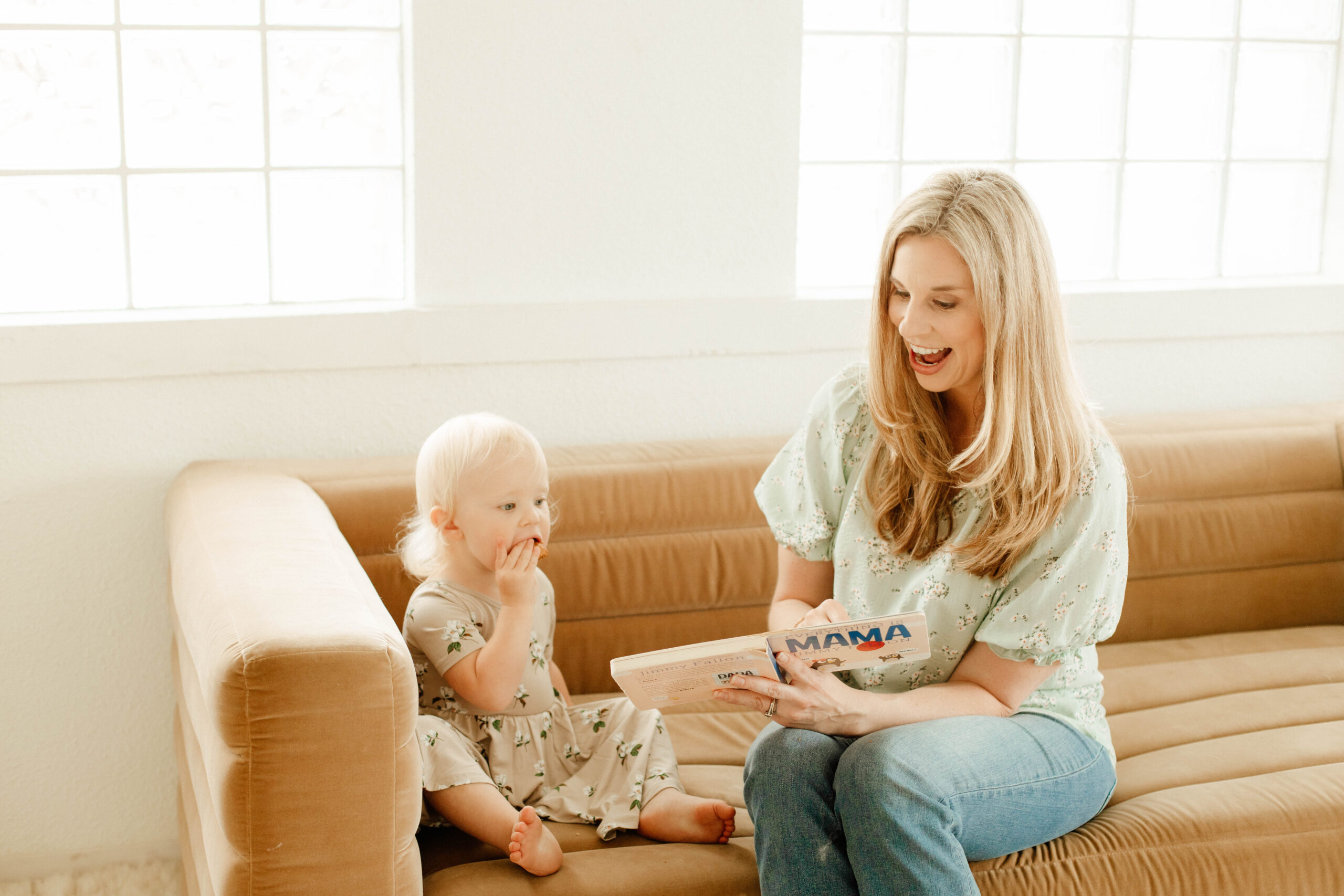
September 29, 2022
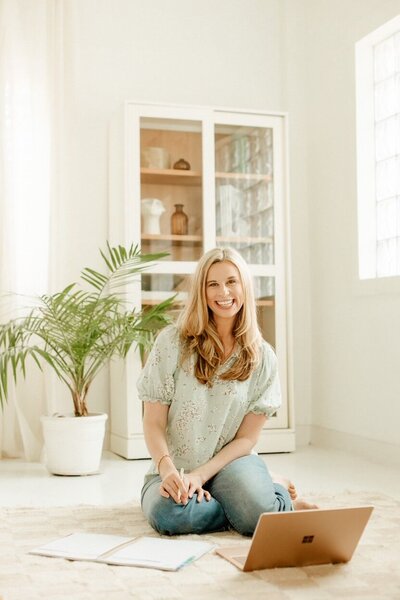
As a speech therapist specializing in working with toddlers, books are a go-to activity for me! Here are a few that have become all time favorites over the years:
My First Learn to Talk Book:
We typically hear little ones imitate fun sounds before they imitate words. This book, written by a Speech Pathologist, is full of these sounds. You can model sounds and gestures to encourage your little one to imitate. It also has a wonderful close-up pictures of toddlers saying the sounds!

Brown Bear :
I love to sing this one to the tune of “Twinkle, Twinkle.” Add the animal sounds in to encourage imitation. Pause on wait before saying, “me” and model gesturing to yourself

Dada/ Everything Mama:
I love the repetition of these books. You can incorporate pausing and waiting to encourage your little one to imitate, “Mama” or “Dada”

Who Says Peek-a-Boo?
I love this whole series! Encourage imitation of animal sounds throughout the book.” There is a mirror at the end you can encourage your little one to watch your mouth as you say, “Boo!”

Peek-a-who?
This book is so fun and I love that it rhymes. It also encourages lip rounding, which we need for the vowels o like “no” and oo such as in “two”

My First Noisy Books :
The sounds in this book are perfect for encouraging your little one to imitate. You can also target a word like “push” or “help” throughout

Oh No, Poo Poo/Pee Pee:
This silly book was written by a Speech Pathologist. Practice telling the dinosaur and puppy, “No, no” or encourage your little one to imitate “eww” if they are beginning to imitate sounds Link here (not available on Amazon): Bjorem Speech Books | Speech Therapy | OH NO Poo-Poo – Bjorem Speech®
Lift the flap books are great because they add an interactive component. Use this book to model animal noises. You can also model knocking on the boxes to encourage imitation of gestures and signing/saying open before you open each box

All Better!:
For beginning talkers, I ignore the text and simplify the language such as, “Puppy went boom!” You can model gesture such as blowing a kiss and words like boo-boo and ouch!”

Goodnight Moon:
This classic book is great for imitation of the gesture and/or sound “shhhh!” If your little one is beginning to use more words, they might enjoy saying, “Night Night” to all the animals

« Using Gestures with Late-Talking Toddlers
Traveling with a Toddler? Ideas to Keep them Entertained »

Browse By Category
now trending
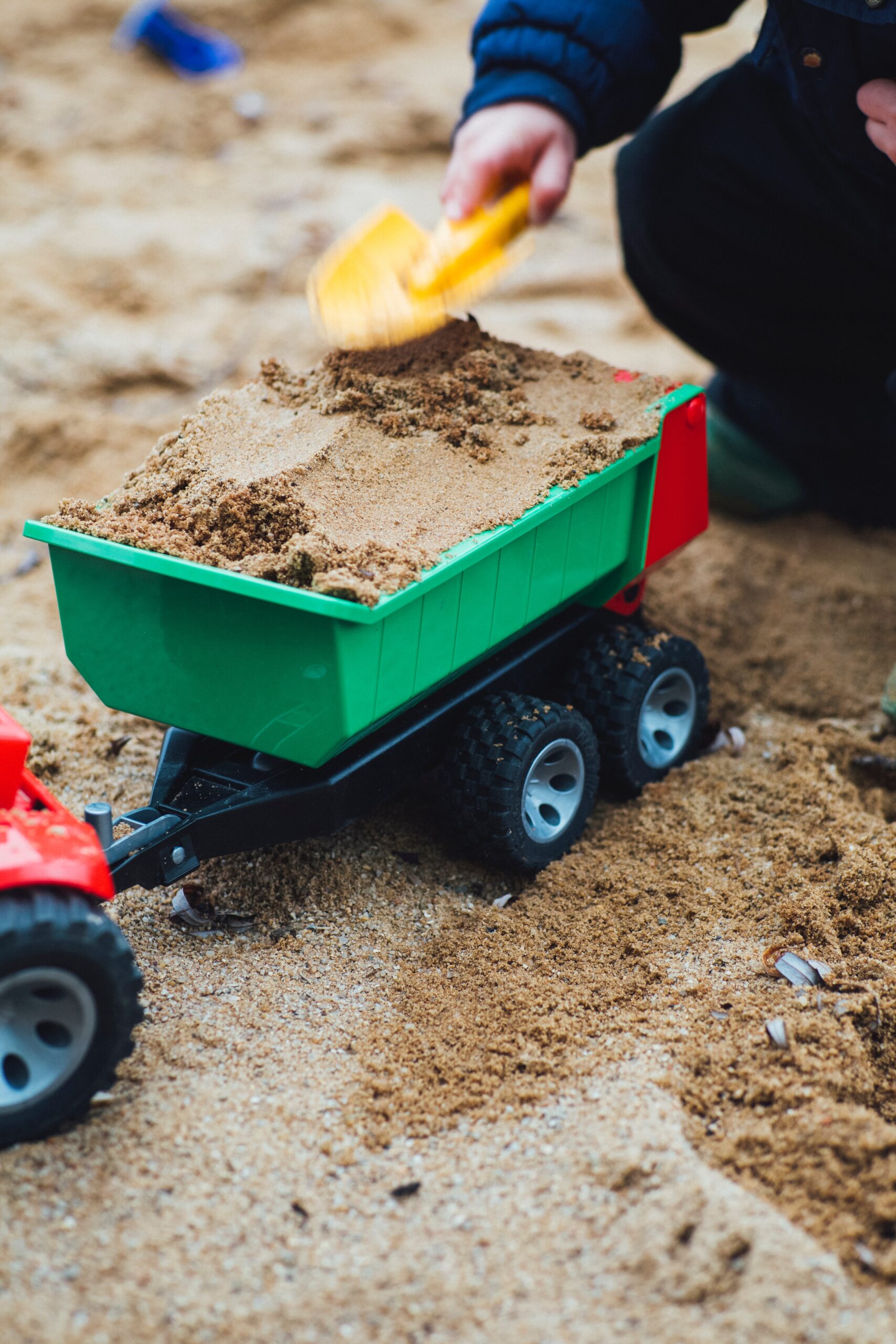
Language Development
Using a Farm in Speech Therapy
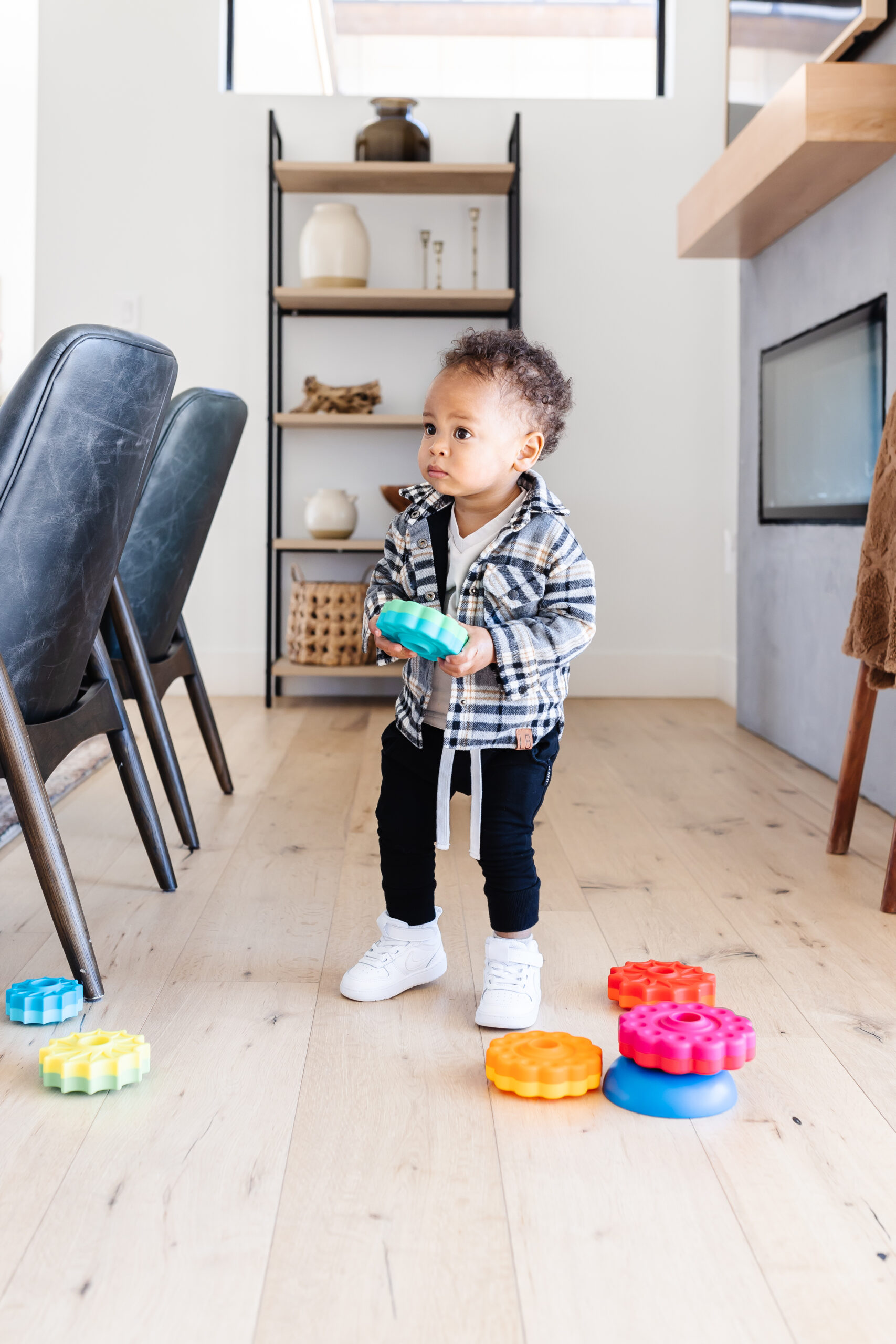
Late Talkers
Do Boys Really Talk Later Than Girls?

Toddler with a Speech Delay Biting or Hitting? Try these!
Featured posts:.
A farm of my favorite toys to use in speech therapy! Here are some ways you can use a farm to work on talking with your toddler at home: Imitation: Imitation is the first step on the road to using words. We can encourage imitation by modeling animal sounds. Not only is it […]
READ THE POST
More from Around the Site
Yes… but only by a little bit Girls tend to reach all of their language milestones first, including the number of words they produce, the number of words they understand, the number of words they combine, sentence complexity, and sentence length. There are different reasons scientists use to explain these […]
Although biting and hitting are common concerns. Children with speech delays are even more likely to exhibit “behaviors” like biting and hitting because they just don’t have the words to communicate. All behavior is communication. It’s helpful to view behavior through this lens because it helps us find ways to address the underlying cause. In children with […]
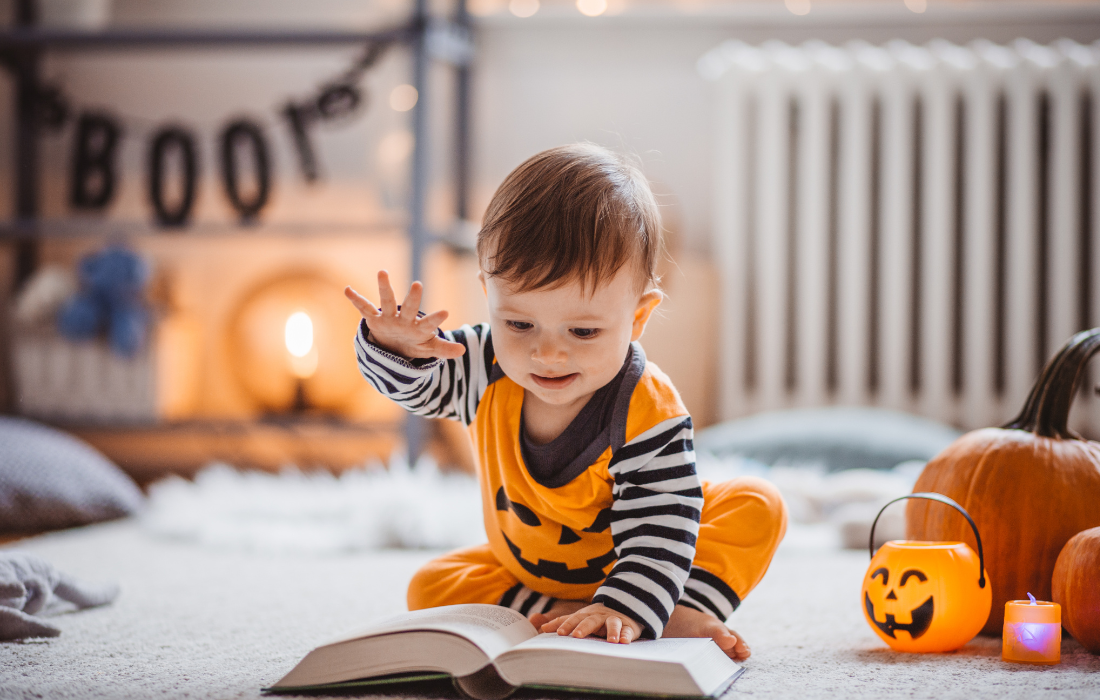
Halloween Books for Littles (By Age)
It’s that time of year! Time for pumpkin patches, cooler weather, and new books! Books are such a great way to learn about new things and experiences. Books can also reinforce what your little one is learning about out in the world. For example, if you are planning to go to a pumpkin patch, you […]

Traveling with a Toddler? Ideas to Keep them Entertained
There’s no denying that traveling with a toddler can be tough! Here are a few ideas that might keep your little one entertained while traveling to your next destination! Painter’s Tape: Make a track, shapes, letters, etc. I love all the colors in this set Water Wow Books: So fun and no mess Quiet Books: […]
As a speech therapist specializing in working with toddlers, books are a go-to activity for me! Here are a few that have become all time favorites over the years: My First Learn to Talk Book: We typically hear little ones imitate fun sounds before they imitate words. This book, written by a […]

TOP RESOURCES
Blog Post or Freebie
Etsy sriracha williamsburg thundercats literally vinyl selfies distillery squid humblebrag. Glossier church-key subway.

Get My First Free 50 Word Checklist When You Subscribe
Free Milestones Checklist
Get it here
© French 75 2023. All rights reserved. | Legal | Design by TONIC

10 Books That Get Toddlers Talking
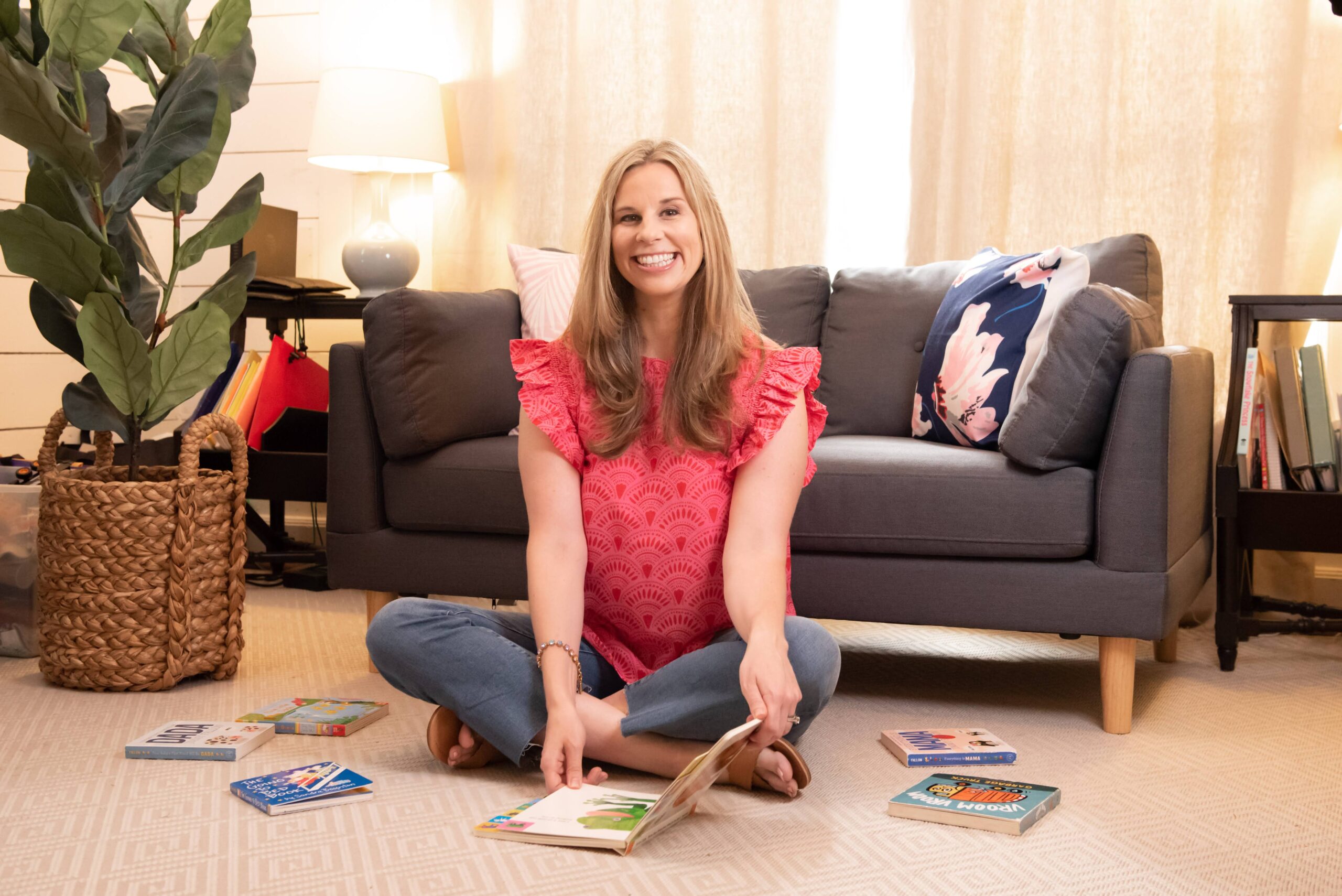
November 30, 2022
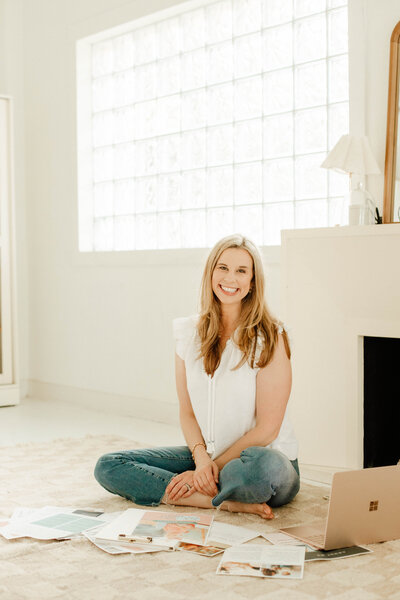
Fostering a love for reading early on builds strong foundation for literacy
But it can be hard to keep little ones engaged, right? Here a few tips to choose books for your toddler (and their toddler attention span)
- Choose books that are interactive like lift the flap blooks or books with a sensory component
- Choose books that don’t have a ton of words to keep your toddler engaged and to keep them from getting overwhelmed by too much language
- Choose books that are repetitive so there are opportunities to hear words over and over (and say them when your little one is ready!)
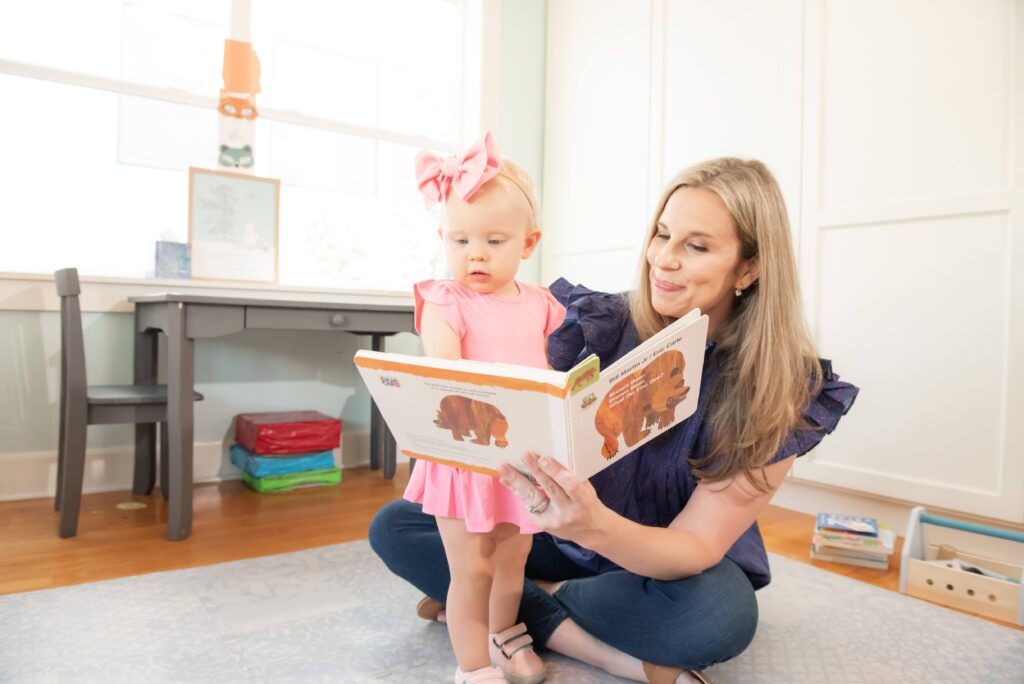
Books are great for talking too!
Here are some tricks encourage more talking with books:
- If there is something that happens repeatedly in the book like opening a flap, say that word each time you do the action so your toddler can hear the word repeatedly
- If there is phrase that is said over and over, try pausing to encourage your little one to fill in the blank
- Add fun sounds to encourage imitation. If there is a car say, “Beep Beep!” as you point to the car
- Try having your toddler face you while reading so they can see your mouth and facial expressions as you say different words
Here are a few of favorite books to use in speech therapy with late-talking toddlers:
My First Learn to Talk Book:
We typically hear little ones imitate fun sounds before they imitate words. This book, written by a Speech Pathologist, is full of these sounds. You can model sounds and gestures to encourage your little one to imitate. It also has a wonderful close-up pictures of toddlers saying the sounds
Brown Bear:
I love to sing this one to the tune of “Twinkle, Twinkle.” Add the animal sounds and actions to encourage imitation. Pause on wait before saying, “me” and model gesturing to yourself
Dada/ Everything is Mama
I love the repetition of these books. You can incorporate pausing and waiting to encourage your little one to imitate, “Mama” or “Dada”
Goodnight Gorilla
This wordless picture book provides so many opportunities for you to share what’s happening, A recent study found that when books only had pictures, the caregivers did more labeling and describing. The study also found that little ones produced more utterances with these same types of books, meaning they were verbalizing more! I love model “Night Night” and “shh:” throughout
My First Noisy Books :
The sounds in this book are perfect for encouraging your little one to imitate. You can also target a word like “push” or “help” throughout
Oh No, Poo Poo/Pee Pee:
This silly book was written by a Speech Pathologist. Practice telling the dinosaur and puppy, “No, no” or encourage your little one to imitate “eww” if they are beginning to imitate sounds Link here (not available on Amazon): Bjorem Speech Books | Speech Therapy | OH NO Poo-Poo – Bjorem Speech®
Let’s Go, Puppy!
Written by a Speech Pathologist, this book is perfect for working on early words and gestures as well as beginning sequencing as you follow puppy throughout his day! Watch a video me reading this with Aubrey here:
View this post on Instagram A post shared by Brooke Andrews, Speech Therapist (@thelatetalkerslp)
All Better:
For beginning talkers, I ignore the text and simplify the language such as, “Puppy went boom!” You can model gesture such as blowing a kiss and words like boo-boo and ouch!”
Where’s Spot?
This book is great for yes, no questions, copying animal sounds, and copying actions. Knock on the door before opening to see if your little one will copy you and model “open” in an exaggerated way to model functional vocabulary
Melissa and Dog Popping Books:
These books are interactive and great for keeping little ones engaged! Model “Pop” each time you pop a bubbles. Once you little one is using more words, model a longer phrase, “Pop the _____” to work towards word combinations. I love the “Goodnight” one because we also practice telling the animals, “Night Night” and gesturing “Shhh!”
Leave a Reply Cancel reply
Your email address will not be published. Required fields are marked *
Save my name, email, and website in this browser for the next time I comment.
« My Toddler Didn’t Qualify for Speech Therapy…Now What?
10 Things to Say to Your Toddler Instead of “What is That?” »
now trending
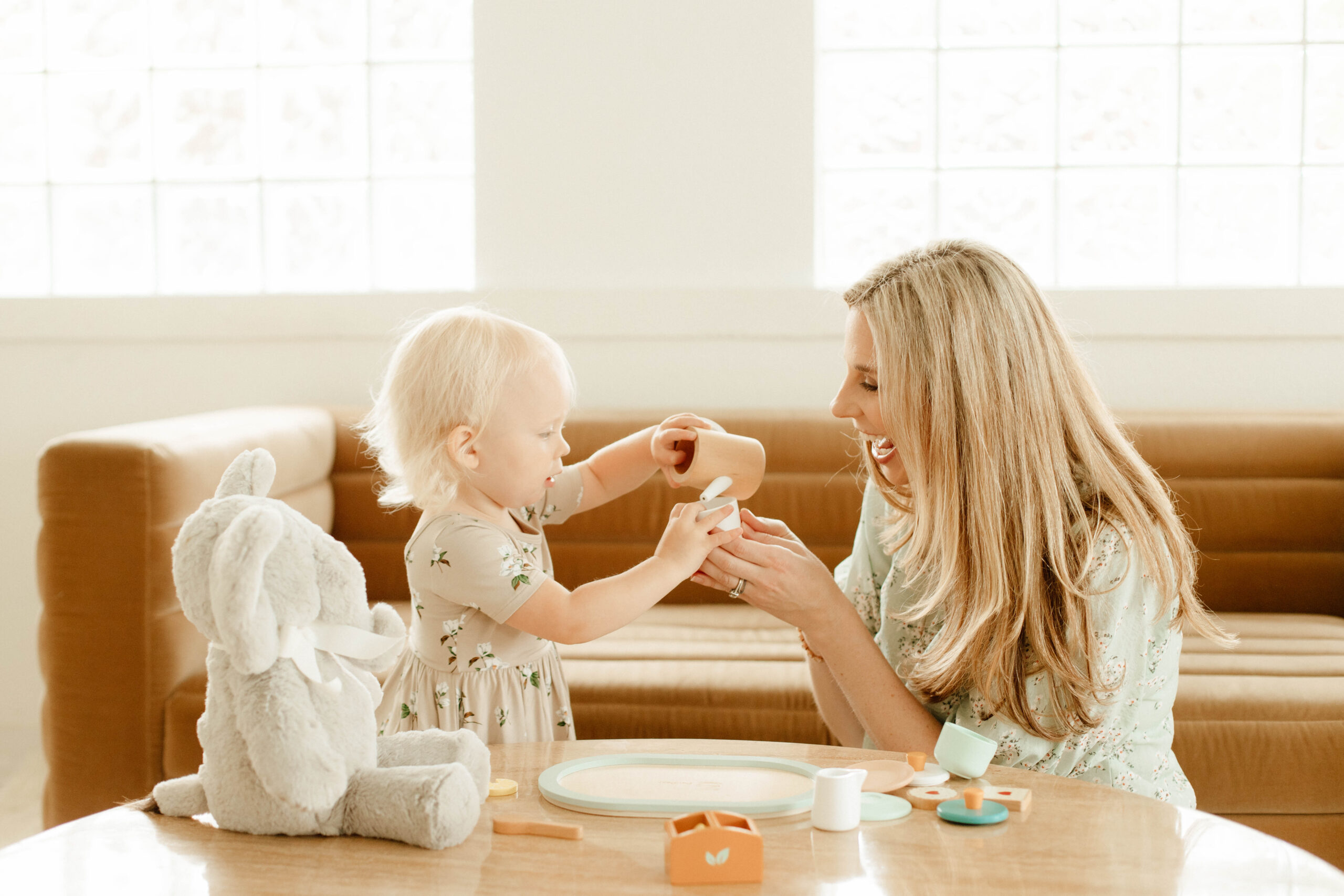
Early Intervention
3 Signs Your Toddler Will Start Combining Words Soon
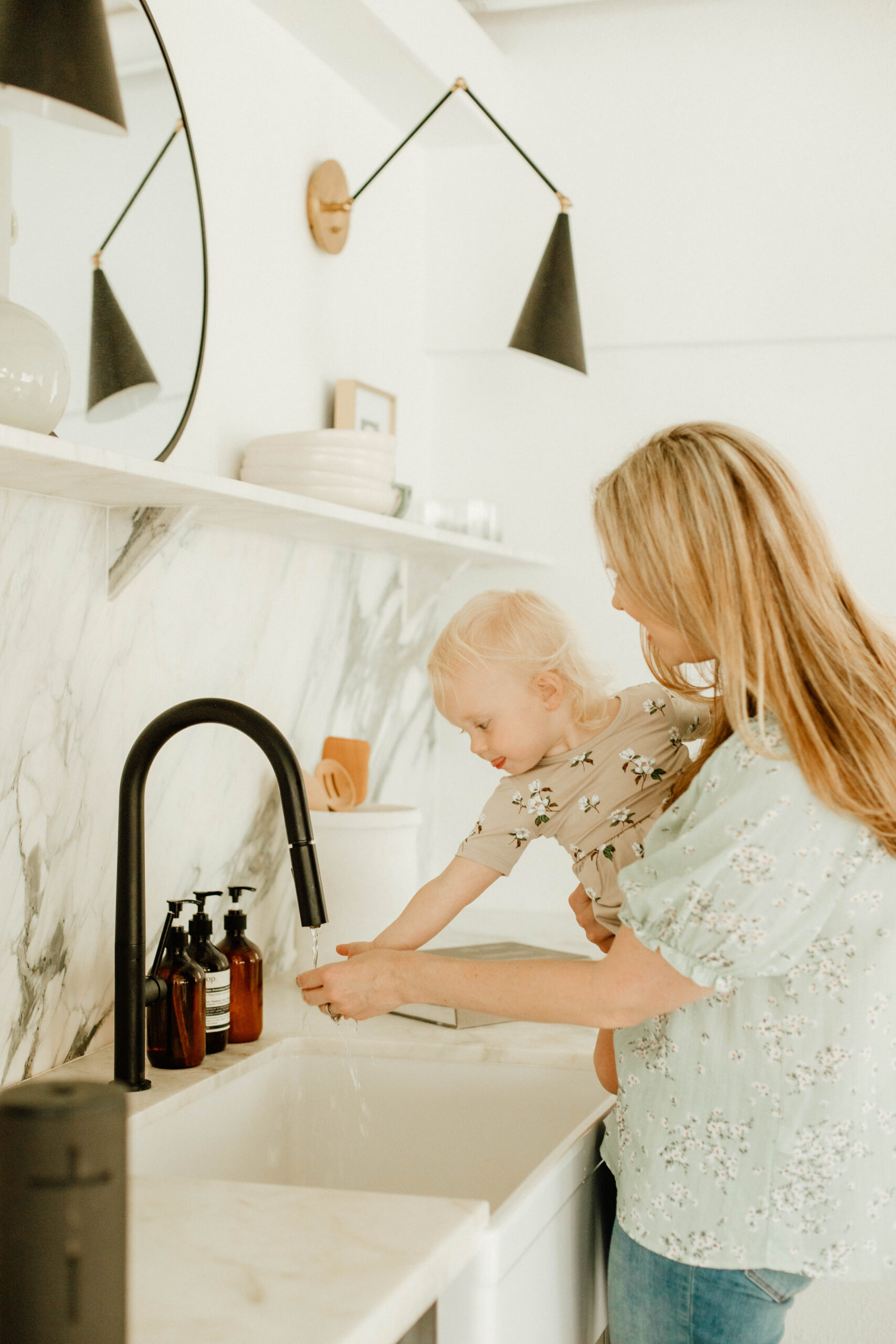
5 Ways to Help Your Toddler Talk Everyday
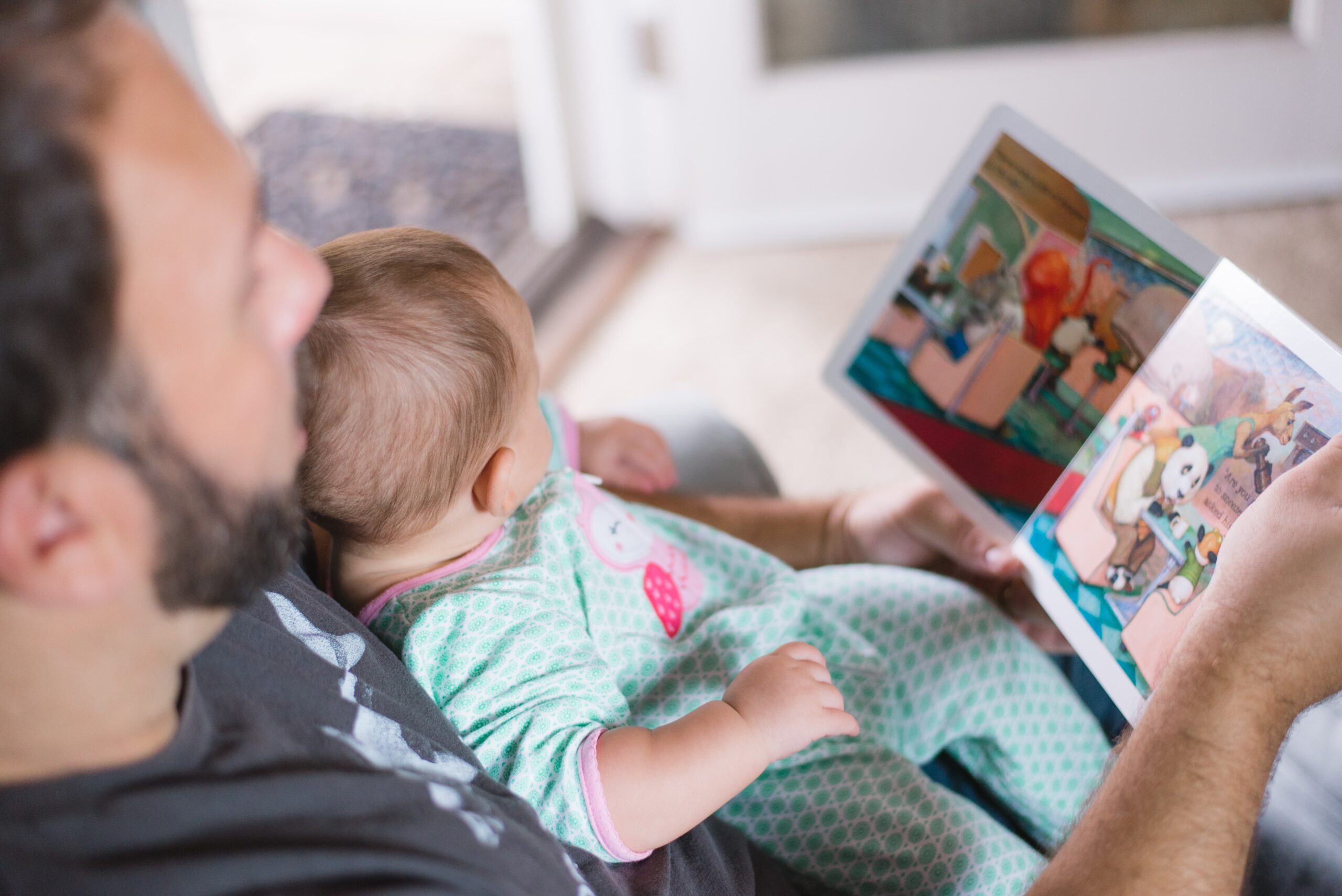
Uncategorized
5 Books Your Baby Will Love
Featured posts:.
Once little ones start combining words, it opens up a whole new world of communication! Now instead of telling you what something is or what they want, they can tell you how they got that boo-boo and all about those ducks they saw at the park. When do we expect toddlers to use word combinations? […]
READ THE POST
More from Around the Site
When I was pregnant with my daughter, I had worked as an Early Intervention speech therapist for over ten years. I pictured myself playing on the floor all day, much like I do in therapy. Flash forward to today and being a mom is nothing like I pictured. Some days I’m low on energy and […]
It’s never too early to start reading to your baby. In fact, a recent study by Logan et al (2019) found that reading at least one daily exposes a child to 296,660 words by the time they are five years old! The key is to make the goal more about exploring the book together. Here […]

Speech Milestones vs Speech Averages – What’s the Difference?
Updated CDC milestones for speech You may have heard the CDC updated the developmental milestones in 2022, including speech milestones. But what do these updates mean? And with different answers from speech therapists, pediatricians, and your neighbor down the street, no wonder it’s confusing trying to figure out if your little one “needs” speech therapy […]
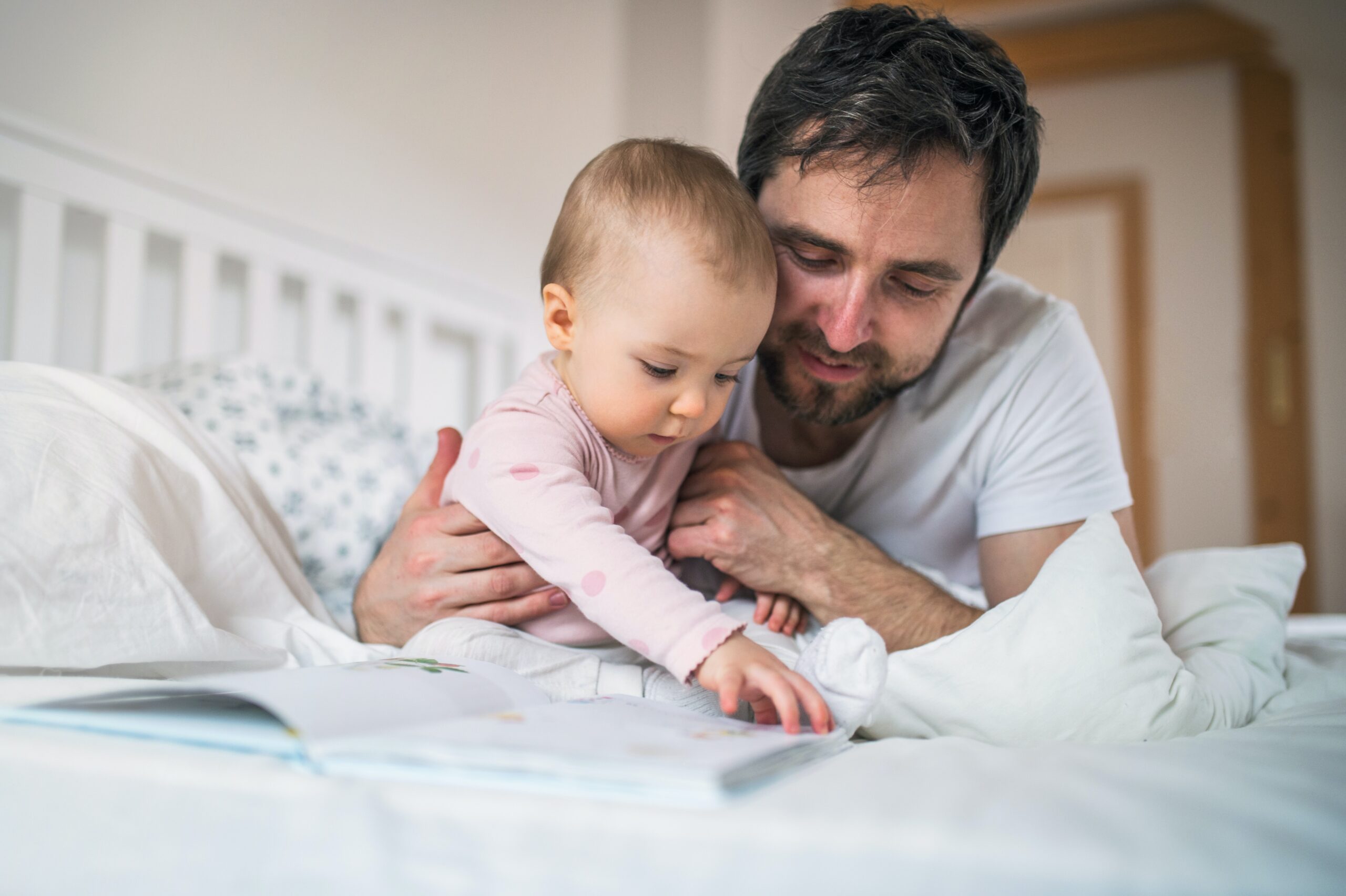
Speech “Mini Milestones”
Your toddler’s speech development One of the best things about my job as a pediatric speech therapist is sharing all of the amazing things that are happening “under the surface” with their little one’s speech and language development! Here’s why: It allows you to be majorly wowed by all that your little on is accomplishing […]
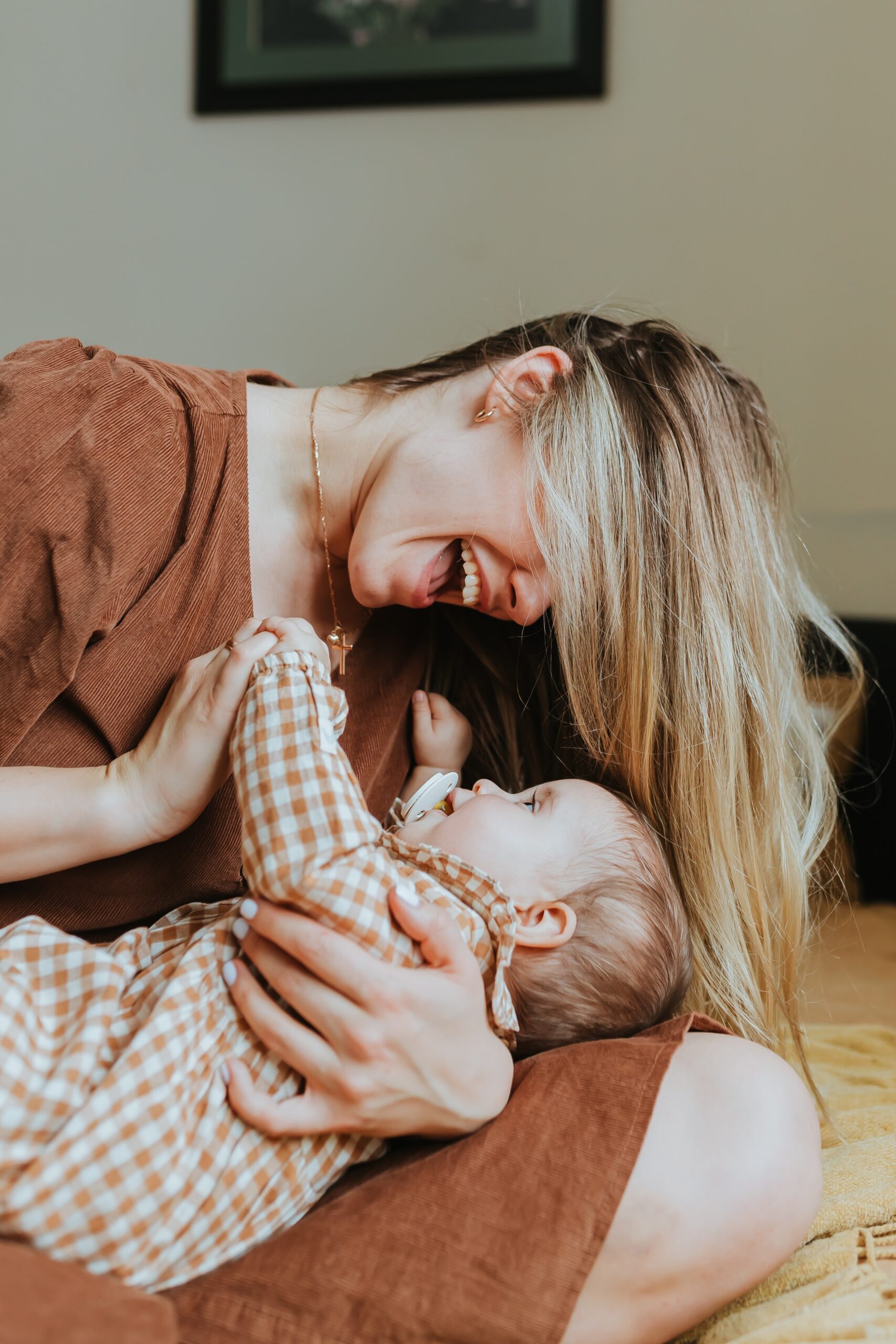
Why Babbles Matter
How babbling begins When we think of babies, we often think of their sweet little voices babbling away. But beyond being adorable, babbling is a huge milestone for speech development! During the first six months, baby’s sounds are primarily reflexive nature and aren’t under their control. This includes sounds like crying, burping, and coughing, Then, […]

Get My First Free 50 Word Checklist When You Subscribe
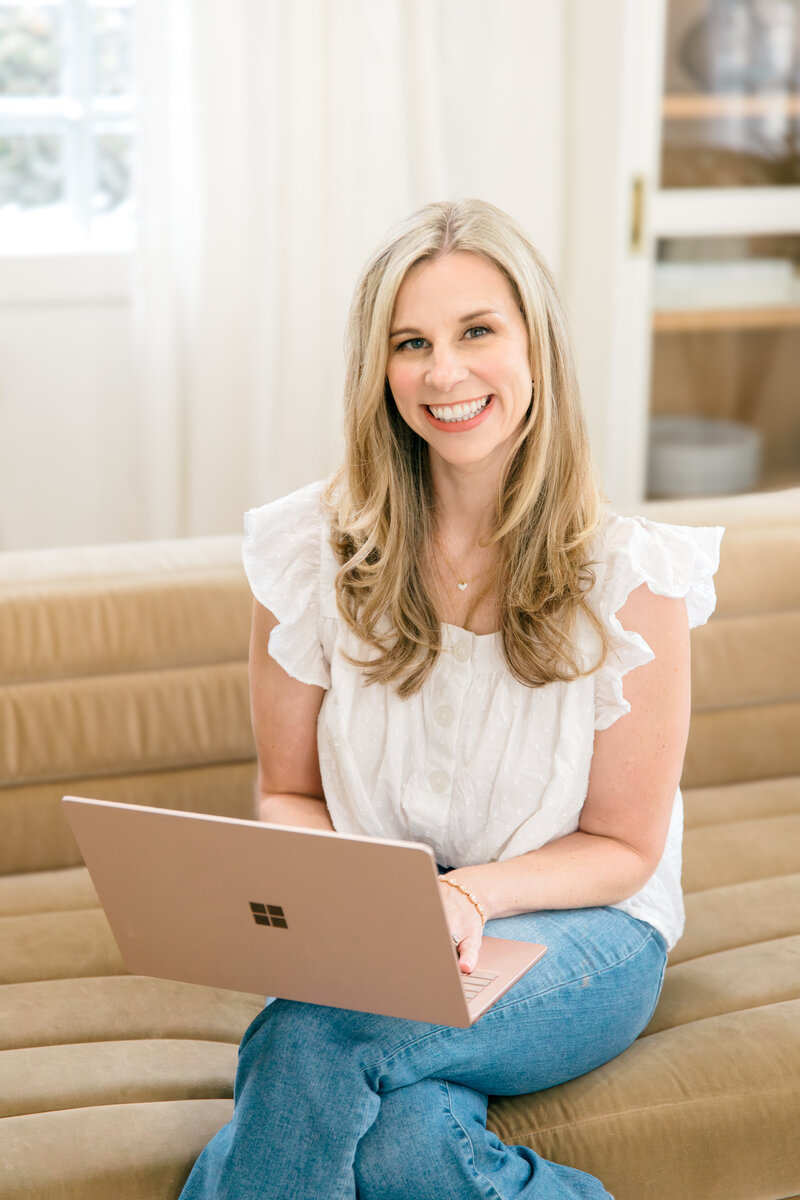
CONTACT
Get on the Big Little List
Toddler tips, tricks, and speech therapy secrets sprinkled with a little bit of #momlife
GET ON THE LIST
© French 75 2023. All rights reserved. | Legal | Design by TONIC
Appointments at Mayo Clinic
- Infant and toddler health
Should I be concerned that my 2-year-old doesn't say many words and is hard to understand?
Talk to your child's health care provider if you can understand only a few or none of your 2-year-old's words. A delay using words or talking can be an early sign of other issues. Your toddler's provider can refer you to health professionals who test children for these issues.
Every child grows and develops at their own pace. But toddler speech development tends to follow a fairly set path. For example, by age 2, most children can:
- Use simple two-word phrases, such as "more milk."
- Ask one- or two-word questions, such as "Go bye-bye?"
- Follow simple commands and understand simple questions.
- Speak about 50 to 100 words.
- Be understood at least half the time by adults who don't know the child.
Between the ages of 2 and 3, most children:
- Speak in two- and three-word phrases or sentences.
- Use at least 200 words and as many as 1,000 words.
- Ask questions that start with who, what, where or why, such as "Where is mommy?"
- Say their first name when asked.
- Refer to themselves with pronouns, such as I, me, my or mine.
- Can be understood most of the time by familiar listeners, such as family members.
If your child might have a condition that causes a speech delay, your child's health care provider may suggest that you see a hearing or speech professional.
For example, hearing problems are checked by an audiologist. A speech-language pathologist checks for communication problems. If your child hears or speaks two languages, see a bilingual speech-language pathologist so your child can get tested in both languages.
In the United States, you can get your child tested through a government-funded early intervention program. This offers services and support to children with delays in development or disabilities. Each state and territory has an early intervention program, and some programs include speech therapy.
The way speech delay is treated in toddlers depends on the cause. When treated early, these delays and the problems that can cause them often get better over time.
Jay L. Hoecker, M.D.
There is a problem with information submitted for this request. Review/update the information highlighted below and resubmit the form.
Children’s health information and parenting tips to your inbox.
Sign-up to get Mayo Clinic’s trusted health content sent to your email. Receive a bonus guide on ways to manage your child’s health just for subscribing. Click here for an email preview.
Error Email field is required
Error Include a valid email address
To provide you with the most relevant and helpful information, and understand which information is beneficial, we may combine your email and website usage information with other information we have about you. If you are a Mayo Clinic patient, this could include protected health information. If we combine this information with your protected health information, we will treat all of that information as protected health information and will only use or disclose that information as set forth in our notice of privacy practices. You may opt-out of email communications at any time by clicking on the unsubscribe link in the e-mail.
Thank you for subscribing
Our e-newsletter will keep you up-to-date on the latest health information.
Something went wrong with your subscription.
Please try again in a couple of minutes
- Infant growth rates
- Vitamin D for babies
- Kliegman RM, et al. Language development and communication disorders. In: Nelson Textbook of Pediatrics. 21st ed. Elsevier; 2020. https://www.clinicalkey.com. Accessed Jan. 24, 2023.
- One to two years: What should my child be able to do? American Speech-Language-Hearing Association. http://www.asha.org/public/speech/development/12.htm. Accessed Jan. 24, 2023.
- Speech and language concerns. Pediatric Care Online. https://publications.aap.org/pediatriccare. Accessed Jan. 24, 2023.
- Is your toddler communicating with you? Pediatric Patient Education. https://publications.aap.org/patiented. Accessed Jan. 24, 2023.
- Kliegman RM, et al. The second year. In: Nelson Textbook of Pediatrics. 21st ed. Elsevier; 2020. https://www.clinicalkey.com. Accessed Jan. 24, 2023.
- Hoecker JL (expert opinion). Mayo Clinic. Feb. 22, 2019.
- Important milestones: Your child by three years. Centers for Disease Control and Prevention. https://www.cdc.gov/ncbddd/actearly/milestones/milestones-3yr.html. Accessed Jan. 24, 2023.
- What is early intervention? Centers for Disease Control and Prevention. https://www.cdc.gov/ncbddd/actearly/parents/states.html. Accessed Jan. 27, 2023.
- Acetaminophen and children: Why dose matters
- potty training
- Cold medicines for kids
- Discolored baby teeth
- Limiting screen time
- Shopping for Kids Shoes
- Temper tantrums
Mayo Clinic does not endorse companies or products. Advertising revenue supports our not-for-profit mission.
- Opportunities
Mayo Clinic Press
Check out these best-sellers and special offers on books and newsletters from Mayo Clinic Press .
- NEW: Listen to Health Matters Podcast - Mayo Clinic Press NEW: Listen to Health Matters Podcast
- Mayo Clinic on Incontinence - Mayo Clinic Press Mayo Clinic on Incontinence
- The Essential Diabetes Book - Mayo Clinic Press The Essential Diabetes Book
- Mayo Clinic on Hearing and Balance - Mayo Clinic Press Mayo Clinic on Hearing and Balance
- FREE Mayo Clinic Diet Assessment - Mayo Clinic Press FREE Mayo Clinic Diet Assessment
- Mayo Clinic Health Letter - FREE book - Mayo Clinic Press Mayo Clinic Health Letter - FREE book
- Healthy Lifestyle
- Expert Answers
- Toddler speech development Whats typical for a 2-year-old

Your gift holds great power – donate today!
Make your tax-deductible gift and be a part of the cutting-edge research and care that's changing medicine.
Speech Blubs
by Blub Blub
Browse topics
All blog posts 405
Popular topics
100+ fun activities for kids that will keep them entertained for hours! Target speech development through play and games. They won’t even know they are learning!
Learn about your baby and toddler developmental milestones! Check if you are on track, when to worry, and how to work on skills like language, potty training, and feeding!
Every child is different! Here are speech and language tips and tools for kids with learning differences, alongside information for parents provided by speech therapists.
Parenting starts with your well-being! Here is some advice on how to teach life skills, work from home, distance learning, along with tips for developing parenting coping skills.
We help kids speak no matter their speech challenges! Speech therapists advise parents about late talkers, speech delay, stuttering, apraxia, articulation, and other speech impediments.
From your first worry to your first appointment, and your last speech therapy session – find the information you need to help your child thrive and gain necessary speech skills.
Parent's Academy › Activities for Kids › Language Activities › Toddler Games, Books and Apps for Speech Development
Toddler Games, Books and Apps for Speech Development
Stacie bennett.
Speech-Language Pathologist , Trenton , New Jersey
Feb 14, 2022 As a speech pathologist, and as a blog writer for Speech Blubs, I get asked questions pretty regularly about what toddler games, books and apps parents can use at home to work on speech and language skills.
These materials will target children who have been diagnosed with a speech delay, but can also be used for kids who have articulation deficits (can’t produce the sounds necessary for clear speech).
From SLP’s Practice to Your Home
If you have been reading my blogs, you know that I’m a mom of a 3 year old girl, Nora and a 7 month old little boy, Nicholas.
A lot of these items I have purchased for my children as a way to build their language and vocabulary. My daughter is “typical” and has speech that is considered “advanced” for her age and my son, well … my son just likes to scream and be held at this point, BUT his speech is on target for his age (e.g., vowel sounds, blowing, and using his voice).
I’m mentioning this to you because I know how important it is as a parent to see your child be successful AND be able to communicate. The items have helped, not only my children, but the students that I work with in early intervention and at the private practice.
Boost Your Child’s Speech Development!
Improve language & communication skills with fun learning!

Toddler Games for Speech Development
1. sneaky snacky squirrel.
Sneaky Snacky Squirrel is a game that is geared towards kids who are 3+ and who are preparing for preschool. No reading is required, which is great! It teaches your child colors, direction following, and turn taking skills. You can also work on counting because they have to have a certain number of acorns to win the games.
2. Pop the Pig
Pop the Pig is a game that teaches counting, numbers, colors and basic vocabulary. You keep feeding the pig different objects (a chance to teach vocabulary) and pushing on his belly until he “pops.” The number of times you push his belly is dependent on the number you roll on the die.
3. Hi Ho Cherry-O
Hi Ho Cherry-O is a very common preschool game that I use frequently with my daughter. This game teaches counting, turn taking, color identification and even early addition and subtraction skills . It’s very similar to the Sneaky Snacky Squirrel game, but with cherries.
4. What’s in the Cat’s Hat
What’s in the Cat’s Hat is another great game by Dr. Seuss. They have created a bunch of cool games for kids, but this one is my favorite as a mom and therapist. It works on asking questions, memory and recall, turn-taking, following directions and deductive reasoning . These are all important skills that kids will need to throughout pre-k, kindergarten and entering elementary school.

Toddler Books for Speech Development
1. duck and goose.
Duck and Goose by Tad Hills is a great book to encourage speech in young children. These two are always up to something and encouraging a LOT of language along the way. (Bonus? They have really dry senses of humor which I totally love and appreciate.)
These books always target early language skills like spatial concepts and yes/no questions to name a few without being a book solely dedicated to those concepts. There’s typically a problem/solution situation which makes for great sequencing, retelling and predicting opportunities for toddlers.
2. Touch and feel books
Touch and feel books have been around FOREVER, but they have to be on this list. They have real life pictures, minimal words and texture opportunities out the wazoo to increase vocabulary, answering “WH” questions, describing and stating opinion .
3. Priddy Baby Books
Priddy Baby Books are my go-to books as a mom and traveling speech therapist. When I was doing early intervention I recommended them to every single family, and they were (almost) the only books I would take into homes.
Books are divided into categories and come in a couple of “first words” editions, too. Bonus? They use real pictures in all their books. My daughter still loves telling us the words for the pictures and wouldn’t give up her book so we had to buy Nicholas his own *insert eye roll.*
4. Your Baby’s First Word Will be Dada
Your Baby’s First Word Will be Dad by Jimmy Fallon is a new book that I just got my son for Christmas. Not only is Jimmy Fallon super funny, but it turns out his book is great for teaching animal names and sounds, big/small, yes/no questions and a repeated word .
5. Finger play book/songs
Finger play book/songs are super great and there are tons of different options out there. These ones are my daughter’s favorite. In fact, we have about 4 “Wheels on the Bus” sound books because they all do different things. You can’t go wrong with whichever one you pick!
On Top of These — Speech Blubs is Your Child’s Best Learning Buddy
The Speech Blubs app is a learning tool that helps pre-school kids jump start their speaking. This SLP-approved app is based on the science of mirror neurons and video modeling to get kids speaking.
Parents also like it because it offers quality smart screen time . Parents can engage with their child, let him/her be in charge and practice with them on a regular basis, role play like there’s no tomorrow, take lots of pictures, and bribe their child with digital candy.
Speech Blubs has 25 sections with over 1,500 activities (including new words weekly, building sentences, numbers, colors, songs, etc.), and most importantly, it includes children in the videos.
The child is more engaged using this for speech activities than if I was to model the sounds myself. The use of children in it to model sound and oral motor sounds is much more engaging for your little one. @LarissaCasamento
The practical ways parents use it include:
- drawing the words with your kid
- singing songs
- finding the words in your toy box, in the kitchen, in the playground
- using it on the go
- and even creating a before-going-to-school routine.
You’ll see, kids become very engaged! Speech Blubs will help turn your child’s vocalizations into babble (we call them “blubs”), and then into words !
Free Assessment!
Take this quiz and get a report on your child’s milestones and a personalized learning plan.

Have a question for our Speech Therapists?

The author’s views are entirely his or her own and may not necessarily reflect the views of Blub Blub Inc. All content provided on this website is for informational purposes only and is not intended to be a substitute for independent professional medical judgement, advice, diagnosis, or treatment. Always seek the advice of your physician or other qualified health provider with any questions you may have regarding a medical condition. Never disregard professional medical advice or delay in seeking it because of something you have read on this website.
Related articles
25 language-boosting toddler games with a balloon.
First of all, the Speech Bulbs App is one option to consider for toddler language games that is a simple and cost effective place to start. Another...
How Common Is Speech Delay in Toddlers?
Their language abilities may be developing at a slower rate than most children’s. They may have trouble expressing themselves or understanding others. Their delay may...
Get started with Speech Blubs
Cancel anytime, hassle-free!

The Best Speech Delay Exercises and Activities for Toddlers
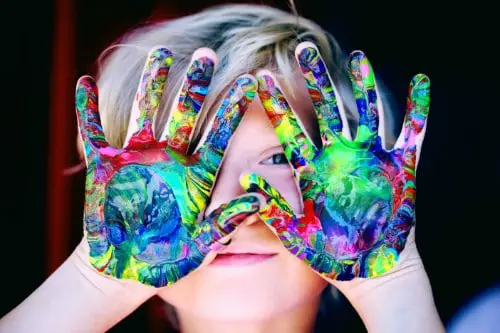
By Lori Ennis, M.S. Ed
You want to know how to help your toddler with speech delay. It’s what parents do best—helping their children in areas where they need help. And, you’ve of course consulted a speech-language pathologist to ask how to deal with speech delay in toddlers so your little one can continue to grow and develop in speech and language. Your next step? Finding the best speech delay exercises for your toddler .
Are there speech delay exercises for toddlers that you can do at home? Absolutely, and we’ve asked clinicians for how to help your toddler with speech delay. Check out these speech delay exercises for toddlers and feel empowered in helping your little one’s speech and language blossom.
How to Help Your Toddler with Speech Delay
Take it from the experts, best tips to help speech delay in toddlers, real life brings about real speech.
You recognize that there is a speech delay with your toddler . Whether it’s an articulation issue, an enunciation or pronunciation issue or something in their motor planning that may be preventing typical speech development (or something completely different), you find yourself googling “Tips for speech delayed toddler” or “How to help your toddler with speech delay.” We know because we’ve been there. If you’re the parent of a toddler with speech delays, how to help them communicate effectively is one of your main concerns. Effective communication helps eliminate frustration on your end and theirs while preparing them for preschool, school and life.
So really, are there speech delay exercises for toddlers that you can do at home? Do they really make a difference in how to help your toddler with a speech delay ?
The answer is a resounding, “YES!” and we’ll share them.
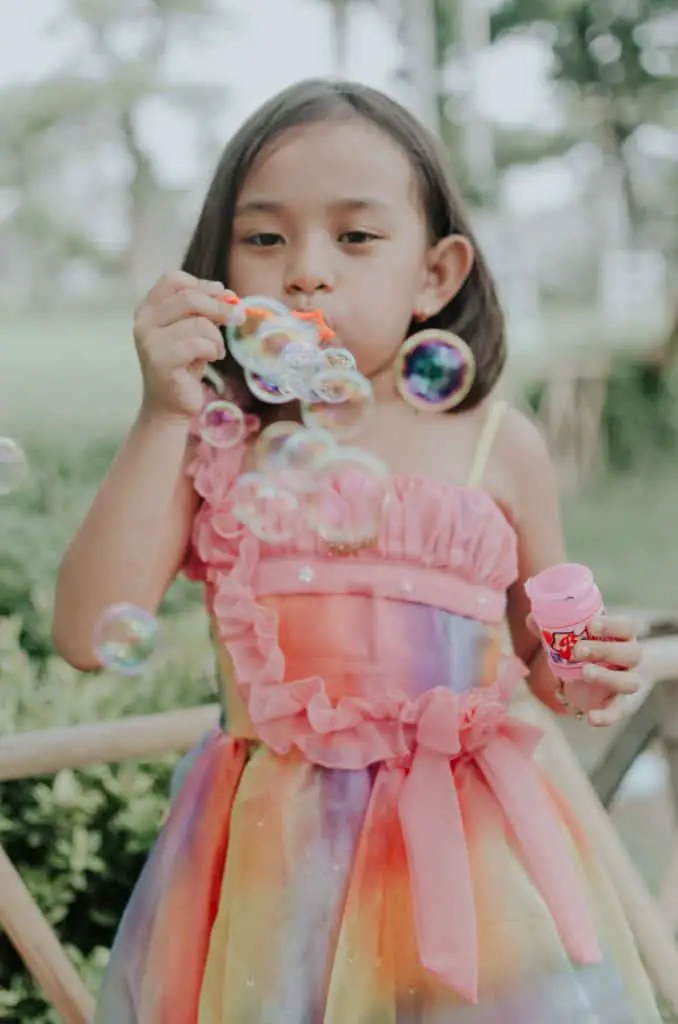
The American Speech-Language-Hearing Association is a wealth of resource when it comes to ways you can encourage development when you have a toddler with speech delays. When it comes to how to help your toddler with speech delay, they recommend some of the following activities to encourage word development, proper articulation and enunciation and auditory processing/comprehension:
- Model good speech. Be clear and precise in your speech to and around them.
- Make sure you use the appropriate word for a baby-talk word as well. You don’t have to stop saying the baby-talk word; just be sure to give them the correct word. (“You’d like your yogi? Sure, here is your yogurt.”)
- Help your child create catalogs of categories for words. “Look, there’s a dog. It’s an animal. What else is an animal? Yes, a cat is an animal. So is a lion. So is a cow.”
- Have them develop speech with the ‘Yes/No’ game. “Do cows eat at the dinner table?” “Am I your mother?” “Do you have four ears?” “Are you wearing a red shirt?” This can be a fun game for your toddler to try and trick you.
- When asking questions of your toddler with a speech delay, give choices. “Do you want to eat spaghetti or grilled cheese?” The more words they hear in context, the better their vocabulary base is.
- Sing songs and tell nursery rhymes and read, read, read to your toddler. The more words they’re exposed to, the better. A recent study suggested that children who were read to each night were exposed to more than a million words more than their peers who were not read to.
Will Oral-Motor Exercises Make a Difference? Dr. Gregory Lof is an Assistant Professor and the Associate Director of the Graduate Program in Communication Studies and Disorders at the MGH Institute of Health Professions. He has suggested that oral-motor exercises may not be as beneficial to speech and language development in toddlers as some might believe.
Dr. Lof believes and offers additional research that suggests oral-motor exercises like blowing bubbles or whistling or chewing on a talking tool may be exercises in futility as they don’t strengthen necessary muscles, and goes one step further in suggesting that strength is not necessarily crucial for speaking anyway.
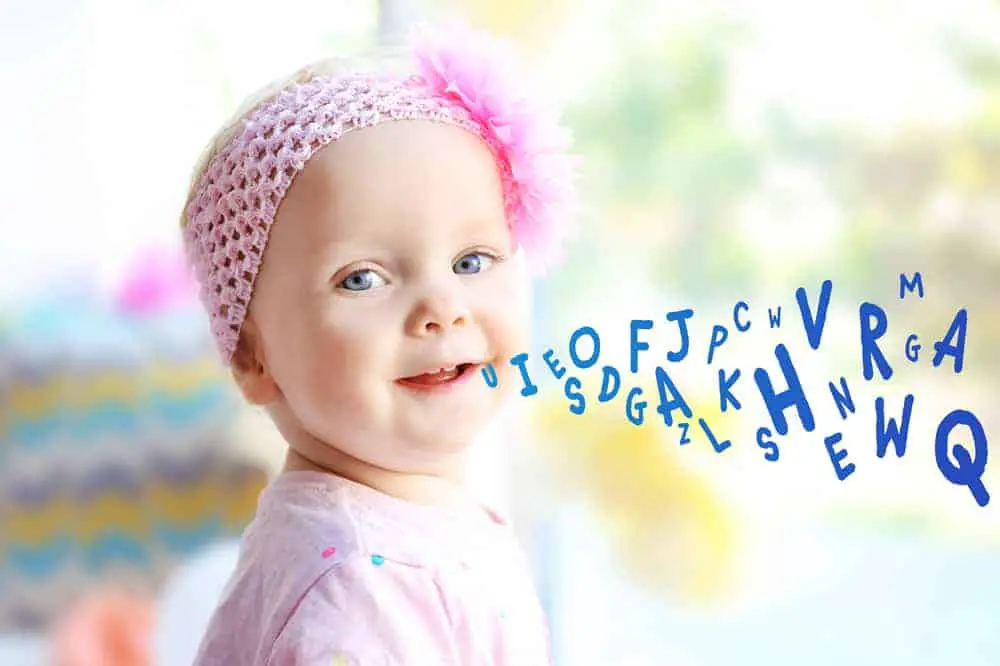
So what do Dr. Lof and so many other clinicians he cites suggest as tips for speech delayed toddler help? He advises working on speech tasks that will actually relate to speech production. In this, you can over pronounce early sounds and be sure to pronounce them very clearly.
Typically sounds that toddlers with speech delays struggle with are /p/, /b/, /m/, /n/, /h/ and /w/. You can help your toddler by being sure (particularly when beginning and ending consonants) to really enunciate the letters. ‘B’ in ‘bubble’ has a lot of opportunity for over pronunciation and enunciation, but any time you use words with those consonants, be sure to give them definition clearly.
Additionally, making eye contact with your child when you are speaking to him or her is important. Not only does eye contact culturally build bonds and relationship, but it also allows your toddler to look at the way you’re forming your letters as you make sounds and words. This is something she can copy as she’s working on developing her own speech.
Most importantly, use everyday situations to help your toddler with speech delays. By this we mean spend a lot of time talking to your child, and through your day. When he gets up in the morning and you’re helping him get dressed, name his clothes—“This is your shirt! Those are your pants! Now it’s time for socks.” When you’re at breakfast, discuss how you’re preparing it, what it will do for your brain and your body—“This is orange juice, and it will help build your bones and keep you healthy!” “I had to crack this egg open before I could cook it. This what cracking your egg open looks like.”
Especially if your child’s responses are challenging to understand, allow them to respond to you and converse with you so they have the practice with not just speech, but speech that is contextually appropriate and meaningful to them. There’s often little fun in ‘speaking’ words only to speak or to learn, but when speech and language acquisition occurs naturally, it makes a more permanent impact.

If you’re looking for more tips on how to help your toddler with speech delay, thankfully there are lots of additional resources to which you can turn as well. If you’re unsure as to whether your toddler’s speech is typical for her peers, or you’re interested in any more tips and information, you can check out the Toddler Speech Boost site and download their free milestone assessment guide.
- REAL MUM TALK
- PARENTING HACKS
- MENTAL HEALTH
- MUM CAREERS
- About Mumernity+ How to write for us
- WEEKLY NEWSLETTER
The best toys and books to help a toddler with speech delay
A few weeks ago I shared my journey in dealing with a toddler who has a speech delay and how we’re going through the speech therapy process . (you can also find an update of it here or follow me over on Instagram, where I also talk about it.)Today I wanted to share some toys and books that have really helped my toddler’s speech delay and ones that are ideal to encourage communication, speech, and socialization; something that many of our toddlers are lacking at the moment due to speech delay (read more about how lockdown has impacted our toddler’s speech here ) Here’s a roundup of the best toys and books for your speech delayed toddler or child; as well as other skills which support speech such as imaginative play. I hope you find them useful! As my son is saying more words, I’ve updated this for those at the next stage of speech.
Disclaimer: AD-Some items on this list were gifted for review with no publication to post. This post also contains affiliate links.
The best books to help with speech delay (helping say words)
‘the sound we found’ book.

This book was recommended by my speech therapist. It’s a storybook specifically created by a team of speech therapists to introduce more sounds and reinforce them. The illustrations aren’t as jazzy as some books but it really encourages you to slow down each sound you make. My son loves this book! This book is more to focus on early sounds and words.
First 100 Word Books-with flaps

Another book we love is this giant first-word book. This book has helped develop Jude’s understanding so much and he can point and identify so many pictures in this book now (not through words, obviously). It’s bright and beautifully illustrated, plus it’s extremely sturdy.
Peppa’s 1000 word sticker book and My Big Book of Spo t.
I’m joining these two books together as we’ve found them really useful to start building words. Really any sticker books are a big hit! A tip with these books is to try and have pauses rather than label everything for your child; so we first waited for him to point at the thing before we labelled it; then we’d wait for him to make a vocalisation and then finally wait for him to try to say the word when he became more confident. The Peppa 1000 word sticker book will keep them entertained forever!
Other books I have found useful for the single word stages: Topsy and Tim , Tales of Acorn Wood, Dear Zoo (all the Rod Campbell books) , The Hungry Caterpillar.
The best books to help with speech delay (developing and helping join words), gakken workbooks.

These Gakken workbooks are absolutely brilliant for playing together and promoting speech. These are for the next stage I think when they do have some words as we’ve only just started doing them. There’s a mix of sticker activities (like dressing the doll); labelling activities; pen skills and lots have talking points/questions on each page. There’s quite a few different ones in the series.

This book is really for children who have quite a bit of language-I think it’s a bit too old for Jude really but we’re still enjoying it. Each page is designed to get the conversation flowing with questions like: ‘if you could eat anything, what would you eat?’ with hundreds of illustrations on each page. It’s perfect for slightly older children to build their imagination and conversation skills!
Chocolate Moose for Greedy Goose

We have just started this book and it’s brilliant (there’s a whole other series too). Each animal is given adjectives too (e.g. greedy goose) and action so it’s amazing at going beyond the first word stage and adding to nouns.
Other books we’ve found helpful for trying to join words: Brown Bear (great for repeating ‘I See’; Toddler Opposites (has short phrases).
Toys to help with speech delay, 1.orchard toys post box game*.

This lovely letterbox game is really great for introducing turn-taking (an important part of speech and communication development that we had to work on with Jude) and encouraging your little one to take turns with you or a sibling to post the letters. We take a letter each and I hold some back to encourage him to let me take turns and ask for one.
It’s a really simple little game but it’s perfect for introducing colours too; since your little one will eventually learn to match the letters to the coloured letterboxes (yellow, green, red and blue). It’s been a big hit in our household and my son got the hang of the postboxes really quickly! We have played this game for over a year now and my son as started to say the colours as well as some of the animals on the cards.
2.Orchard Toys First Sounds Lotto*

Another great Orchid Toy is their first sounds lotto toy. This is kind of a bingo card game where children match their counters to their cards but here’s the clever part: you can use the orchid toys app to connect to the game and play the corresponding sounds to each card. A really fun way to introduce and reinforce animal sounds in particular which Jude struggled with initially. It also comes with a matching chunky jigsaw.
3.Play hooray prompts

If you find it hard to get talking with your little ones, these prompt cards from Play Hooray are perfect. Small enough to keep in your handbag (great for passing on to grandparents too), these mini prompts help you find speaking activities from everyday items and experiences as you go about your day with a busy toddler! They also do some great play prompt cards too.
4. Magnet Board
Another thing that we’ve found super helpful is a magnet board. My son loves magnets and you can order some great picture magnets for things like food and animals. It’s just another way to increase the number of times they hear a word (our speech therapist gave us a little tip, make a game of taking one out the box at a time so they really listen to the word). We ordered this one and some magnets of animals and food, along with letters and numbers. If Jude is a bit stir crazy, we throw these and make him run and fetch then label the magnet he’s found!
5. Classic World Tic-Tac Clock Game

This clock toy game from Hippychick is great for building speech around colours, shapes and numbers and of course building language around telling the time when your child gets that little bit older. My son loves the chunky pieces and we’ve found it a really great turn-taking game too as you can alternate the turns you and your child have (this is all great in helping them understand we take turns in speech). We also take the pieces and give them to him one at a time to encourage the word ‘more’. The pieces are really well made and this wooden toy has lasted ages!
6. Little Gibson Woodland Friend*

Another thing that’s really helped my son’s vocabulary is puzzles. He’s always been really good at puzzles so he loves these Little Gibson ones (they also do a great fruit one). They’re two-piece so they’re a great first puzzle and once made, you can use them as a vocabulary game for identifying and making animal sounds. As my son has gotten older, I now use puzzles a bit differently. I hold some pieces back so we do them together. So I’ll say ‘birdie or rabbit?’ he’ll respond and then I’ll give him those pieces. It’s a good way to make puzzles a joint activity, slow it down and get more words in.
7.Busy Books
Busy books have really helped Jude with things like shape and colours and are also a great way again for repeating vocabulary. You can buy these from l ots of different places or even make your own-I have a laminator and google free printables on Etsy and make them around things like body parts or Peppa characters! If your child is quite practical, these books are a really great way of keeping them ‘busy’ and constantly reinforcing the language of nouns. Another alternative are puzzle books.
8. Ready steady toys
Finally, we use anticipation toys to learn ready, steady (well the aim was for him to say go but he says these words instead!). These are things like push along cars (like this Peppa one which he LOVES), wooden car ramps or this frog jack in the box. These types of toys all require adults to help (other ones are like wind up toys or spinning tops. ) so they encourage communication and the anticipation means the child is more likely to make eye contact. Again, I found pausing really helped with these toys so I would say ‘ready’ and then eventually he learnt joining in with ‘steady’ made the action happen.
9. Flashcards
I know some are on the fence about flashcards but we’ve found them useful and use these ones. We don’t practice with them like rote learning but we play games with them instead.
Toys to help with imaginary play
My final tip for toys to help toddlers with speech delays are imaginary play toys. That could probably be a whole other article (and I may do a full article on this separately) but I thought I’d mention a few of my favourites here. We also have this fisher price kitchen; a pretend lawnmower and a doll with a highchair which Jude has actually really taken to. Imaginary play is really important for encouraging speech so it’s definitely worth spending time working on!
Busy book (with figures)

A different type of busy book is My Busy Books ; which are a combination of books and figures. We love these and the figures are great fun to bring some life to reading. These books also come with a wipe-clean play mat which you can use to play with the figures on and is again great for building vocabulary.
Other ideas for imaginative play toys are…
-shopping basket with vegetables
-a dollhouse (we have the Peppa pig house with playground slide since my son loves Peppa so much and it’s really helped his play and speech)
-train set.
Apps and Youtube videos to help with toddler speech delay
We’re at the home straight but finally a few youtube and app recommendations.
Youtube: Yakaa Dee, Tale of Acorn Wood/Dear Zoo (they are simple animated readings with lots of pauses) , Letterland (for phonics), Lego Duplo (simple but promotes words) , Hungry Caterpillar.
Apps: Pogg (very simple, designed for you to sit together and talk); Peekaboo barn (learning animals), Toca Kitchen, Peppa Pigg app, Letterland (for phonics).
I hope these play ideas have been useful in developing your child’s speech. I have a few more posts on toddler speech delay here. For the past year and half, my son and I have been on a speech delay journey-which we’ve chronicled on I nstagram and on this blog! I’ve written an ebook all about our journey from pre-verbal to speaking to help other parents in the same boat. I
f you’re at the start of your speech journey and want to learn from a mum who has been on the path for some times, this is the book for you! It’s divided into five sections: our speech journey; encouraging pre-verbal communication; encouraging emerging words; helping conversations begin and how to deal with the emotional impact of being a speech delay parent because IT’S HARD!
12 comments
Hello. I’ve made a book called ‘where is the bird’. It’s available on Amazon. It’s a buggy book + app that inspires parents to use simple signs with preverbal children.
This week is sign language week. British Sign Language is a rich, untapped cultural resource, and a language like any other. Yet we are not exposed to sign language with the same frequency as spoken languages.
The vision behind my book ‘Where is the Bird?’ is to inspire all parents, deaf and hearing, to use sign language with their children, helping them communicate complex concepts quickly and effectively, even at a distance.
For hearing families, using simple signs from early infancy can help reduce the Terrible Twos, a time of frustration whilst hearing children learn to speak.
For the Deaf community, Augmented Reality animations bring a static page to life, and the MR videos translate English words into BSL signs, embedding a previously unprintable language into the page.
My ambition from this book is for every family to know the 20 signs in it. Even a basic commonplace understanding of BSL would improve integration between Deaf and hearing communities.
http://bit.ly/WITBvideo
The ‘BabyBSL’ app is a free download (no ads) on the App Store and GooglePlay. The book ‘Baby BSL: Wheret is the Bird?’ is available for sale on Amazon.
Love the 100 words book. I had one like this as a baby and my nan recorded me going through the pictures. Best one was when I said ‘I is for spider’ – meaning insect haha
What an excellent post. Very helpful suggestions to encourage speech development through play.
There are some inspirational ideas here
I am so grateful for the post thank you so much for sharing with us, I have an 18 month old and will benefit from buying some of these in the future.
I love the idea of Play Hooray Talking Prompts… What an amazing idea to get talking! Thank you
First 100 words is great for improving understanding. Mr Tumble is great too with my youngest we learnt a little makaton and it really helped with frustrations and tantrums.
I love the Orchard toys games and use them with my son who has a speech delay and he really enjoys playing them.
Really like Orchard games to get kids talking and involved in a fun game
I love the games – these would help speech development so much because what child wants to miss out on fun games like these?!
Thank you for these recommendations, they will be a big help
- Pingback: Tonniebox review: is it worth buying for a two-year-old? - Mumernity
Leave a Reply Cancel reply
Your email address will not be published. Required fields are marked *
Save my name, email, and website in this browser for the next time I comment.
- Who are Seeme and Liz?
- Work With Me
- Learn To Blog

- Play Kitchens
- Play Houses
- Best Learning Toys For Babies
- Best Learning Toys For 2 Year Old’s
- Best Learning Toys For 3 Year Old’s
- 4 Years and Older
- Pretend Play: Why It’s Necessary For A Child’s Development!
- Top 3 Benefits of Learning Through Play
- Birth to 2 years old
- 2 to 4 years old
- Speech and Language Tips and Tricks
17 Tips To Help A Toddler With A Speech Delay
- Ages and Stages – Language Development Milestones
- General Tips
- Birth to 2 Years Old
- 2 to 4 Years Old
Seeme & Liz > 17 Tips To Help A Toddler With A Speech Delay

For the purpose of this article, a toddler refers to children between the ages of 18 and 30 months (give or take a few months). However, many of these tips will work for other age groups as well.
Before I get into the tips I want to make sure you understand the difference between speech and language, as many people will say “my toddler has a speech delay” when they actually are referring to a language delay.
So here is a very brief overview of each:
What is Speech Development?
Speech development refers to the production of specific speech sounds.
Most children will learn the sounds /p/, /b/, /m/, /n/, /h/ and /w/ first, along with some basic vowel sounds.
What is Language Development?
Language development refers to both the use and understanding of language. This encompasses:
- learning and using new words
- understanding words
- combining words into phrases and sentences
- asking and answering questions
- following directions
- social skills such as turn taking, eye contact, etc.
As I said, this is a basic overview to show you the differences between speech and language development.
The tips I am about to share with you will be for both speech and language! Make sure you have some time set aside to get through the entire list!
If you feel (or have been told) that your toddler’s speech and language development is not where it should be for his/her age give these tips a try.
Speech Delay In Toddlers: 17 Ways You Can Help At Home
*This article may contain affiliate links *
1. Have Your Child’s Hearing Checked
Even if you think that your toddler can hear everything, their hearing may not be 100%. The cause of a mild to moderate hearing loss in toddlers is usually due to ear infections and/or middle ear fluid.
Since any language a young child is hearing is new to them, they don’t know what to expect. So they must hear everything clearly if they are going to use and understand that language.
Something as simple as fluid in a child’s ears can affect their hearing.
Imagine yourself underwater and hearing a language that you are not familiar with. This is what it can sound like to a child with a hearing loss as a result of middle ear fluid.
If your child has a history of ear infections, you can make an appointment with an audiologist to have your toddler’s hearing checked.
2. Seek The Advice of a Speech-Language Pathologist
If you ever feel like your child is delayed in any area of development seek professional help. The earlier the better!
A child’s early years (birth to 3) are a crucial time in their development. Please do not take on a “wait and see” approach when it comes to your child. You are not a bad parent because your child is not developing as per expectations. And you will be a great parent by seeking help for your child.
To find a licensed Speech-Language Pathologist within North America, please click on the Resources tab. In North America Speech-Language services are often publicly funded for children under the age of 3!
You can also get started with the It Takes Two To Talk book, written by Speech-Language Pathologist Elaine Weitzman.
This book has so much actionable information for parents! Please do not be discouraged by the price tag!
3. Speak Slowly
Think about yourself learning a new language. If the people you are in regular contact with are speaking quickly and never repeating themselves, you would have a hard time learning that language. The same goes for your toddler. This is especially true if your child is learning more than one language.
If you notice your toddler has tuned you out, or seems to be ignoring you, it could be because you are simply going to fast and they can’t keep up (or it could relate to Tip 1).
Slow down when you are speaking directly to your child! You don’t need to sound like you are in slow motion, but take your time when speaking.
Be sure to use baby talk correctly though!
4. Make Eye Contact
Make sure you are looking at your child when you are speaking to them. Children can learn a lot by looking at your mouth while you are speaking. Making eye contact is also an essential part of communication (in most cultures). It’s a foundation skill that comes naturally to most children!
5. Over Pronounce Early Sounds
As I mentioned above, the first sounds typically made by a baby/toddler are /p/, /b/, /m/, /n/, /h/ and /w/. If your child is struggling with these early sounds make sure you are pronouncing them very clearly. And from time to time, over pronounce them.
For example, if you are blowing bubbles for your child really enunciate the “p” in “pop”. You can even point to your mouth to draw your child’s attention to the movement of your lips while you are saying “pop”. The same goes for “bubble”.
6. DO NOT Make Your Child Repeat You
This can be a tricky one for many parents. I have seen it happen many times.
A child will say a word, for example “bud” (for “bubble”) and the parent will say something like “oh you mean bubble, say bubble, I know you can, say bubble.” This will result in your toddler becoming very frustrated and tuning out.
It’s ok for you to repeat the word, but drop the expectation of having them repeat you. While you may think your child should be capable of saying the word correctly, they probably aren’t.
Many toddlers are not developmentally ready to pronounce every sound and word correctly.
Pronunciation, or articulation involves many muscles and fine motor skills that a toddler has not developed yet.
7. Be a Good Speech/Language Model
This one is pretty much a summary of tips 3,4,5 and 6.
If you are following all of these tips, then you are being a good speech and language model! And this leads us into tip 8.

8. Repeat, Repeat, Repeat
You will feel like a broken record, but your child needs the repetition. Children need to hear words 100’s and often 1000’s of times before they begin using the word themselves in a meaningful way (not just repeating you or only using it in certain situations).
Let’s go back to the bubbles activity. Narrate what you are doing.
For example, you could say “look at the bubble , do you see the bubble? The bubble is floating away. Uh oh, the bubble popped. Let’s blow another bubble “. In the 2-3 seconds it took you to say those phrases, you have said the word “bubble” 5 times!
9. Get Down to Your Child’s Level
Your child will gain more from your interactions with them if you are down at their level. This means getting down on the floor and playing. I know this can be hard for some parents.
I will admit that despite my background and having worked with children before having my own, this was one of the hardest things for me to do. It just didn’t feel natural to me. I would have much preferred to sit on a chair and “observe” my children.
However, I know the importance of “getting down to their level” that I made myself do this.
It does get easier and the reward of seeing your child’s smiling face makes it worth the effort. So let your inner child out!
10. Choose Toys Without Batteries, or Remove Them When Possible
This section has so much information that I actually made it an article of its own !
Toys with batteries can get quite annoying. And for toddlers, the sounds that these toys make will not enhance their learning.
Some toy manufacturers claim that their toy will teach a child “letters, numbers, colors, etc”, but I have to disagree and many others would support this idea. The whole goal is to get your toddler vocal and verbalizing.
If the toy is doing all of the “talking” the child can sit back and listen. Also, most children are more likely to imitate a person over an electronic toy.
Another thing I would like to point out is that you should not be trying to teach your baby or toddler academic skills (don’t even get me started on the “your baby can read” program – luckily the company seems to have gone out of business).
There is plenty of time for a toddler to learn academic skills . Language skills are a greater indicator of success later on in school than the fact that your 2 year old can recite their ABC’s.
Now, all of that being said, I will contradict myself a bit. Don’t feel like you cannot have any toys with batteries. Some toys need batteries for basic functioning. My son had a pretty cool ball drop toy that he engaged with more when the batteries were in it.
It came with 3 clear balls that had little animal figures inside (so of course I always told him the animal names and the sounds they made and said the word “ball” many, many times). He could drop the ball into the trees that were part of the toy and watch them come out and then be spun around. The music it played was a bit irritating, but the spinners didn’t work without batteries.
I love open ended toys such as play kitchens , play houses , dolls, blocks, etc.
There are many more opportunities to develop language skills with these types of toys!
11. Expand and Add Language
If your toddler is starting to use some single words, expand on what they said and add more language.
For example, if your child brings you a toy truck and says “truck” you could respond with “yes, it’s a big truck”, placing the emphasis on “big truck”.
You could then add even more language around the word “truck”. “The truck has wheels” or “The truck is red”, etc. Or if your child drops something and says “uh oh”, respond and say “uh oh, your cup fell down, let’s pick up your cup “.
12. Take a Step Back
Try not to dominate your child’s playtime. Take a step back and watch what your toddler is doing and then wait some more.
Listen to see if your child is saying anything to themselves. Or if they aren’t using any words, perhaps your child is gesturing or looking intently at something. By taking a step back you can find many new opportunities to communicate with your child!
13. Let Your Child Lead
Your child may be interested in things that aren’t of much interest to you. You may try to steer them towards a toy you feel they should be playing with, or an activity you believe would be better for them.
If your toddler expresses an interest in something and you follow their lead , they will be much more interested in interacting with you. You can let your child lead by imitating what they are doing, commenting on what your child is doing and repeating things they say (and expanding), etc.
If you are interested in something, chances are you will be more engaged than if you are doing something that you aren’t interested in. The same goes for a child. If the child is always redirected and doesn’t have the opportunity to do what they would like to do, they will naturally disengage and the language learning opportunities will be lessened.
14. Skip the Academics
As I mentioned in Tip 10, many toy manufacturers are using the fact that their toy teaches “academic skills” as a selling feature. Please do not listen to this.
A toddler does not need to work on academic skills .
What they do need to work on is developing play skills .
Play skills build the foundation for academic skills later on!
15. Read, Read, Read
Read to your child daily! Find simple yet engaging books. But stay away from e-books for children of this age group.
While an e-book on a phone/tablet may be engaging because of the ability to touch an item on the screen and watch something happen (cause and effect), studies have shown that children do not engage with this type of book the same way that they do with a physical book. Children do not retain what they heard to the same extent that they do with a physical book.
Cause and effect books do exist as physical books! These are usually “lift the flap” books or “pop-up” books.
Looking at a physical book (holding it, pointing to pictures – without something happening, turning the pages) helps with pre-literacy skills and print awareness.
When looking at books with your child, you do not always have to read the story word for word. Make it up as you go! Let your child point to items in the book and then pause and wait. Listen; your child may say or sign something.
If the book you are reading is a repetitive book such as the classic “Brown Bear Brown Bear” by Bill Martin/Eric Carle and your child has heard it several times, pause to see if your child will fill in the blanks.

16. Ask Questions (but not too many)
Ask your child questions to keep the conversation going, but don’t ask too many. You don’t want to come across as a drill sergeant.
Ask simple questions such as “where is the ball?” (assuming the child can see it) or “what is on your foot?” This will help with a child’s understanding of language and reinforces vocabulary words.
However, don’t “test” your child. This will end up causing a lot of frustration and perhaps even some temper tantrums.
17. Use Routines, Songs and Finger Plays
Some childhood routines you may be familiar with such as peek-a-boo .
A routine basically has certain steps that follow an order and can be repeated many times. Children learn from these routines because of the repetition and if the routine is a people game such as “peek-a-boo” it is also quite fun for the child. You can also make up your own routine if there is something your child is interested in.
My children loved the “fall down” routine we made up when they were around 2 years old. I would have them sit on my lap and move my legs up and down while saying “bump, bump, bump”, then I would pause and say “uh oh you fell down” and slightly open my legs allowing them to “fall” (while still holding my child of course). This always ended up in laughter and them telling me they wanted more of this activity.
Songs and finger plays are also a great way to help with language development. Nursery rhymes also fall into this category. An example of a finger play would be “This Little Piggy”.
A song that my daughter was fascinated with that we turned into a routine was “Row Row Row Your Boat”. She sat facing me holding my hands. I would gently pull her back and forth towards me while singing. At the end when we got to “life is but a dream” I would slowly let go so that she would end up laying down. She thought it was the greatest thing ever!
Toddlers also love finger puppets that you can incorporate into finger plays! The puppets allow for further vocabulary development and can be used later on for story telling as well.
I hope that these tips will help you and your child! Please leave me a comment and let me know if you are using any of these tips with your child.
Keep this article for reference by pinning any image below to your favorite Pinterest boards!

47 Comments
Enjoyed reading this article, very informative. I’ll be sure to use some of these strategies.
Glad you enjoyed the article!
I love your article. I started researching about speech delay because I already started to worry about my son (turning 2 in 2 weeks). He can’t communicate yet and sometimes he’s not paying attention when I try to say something to him. He already knows the alphabet A-Z, He says letter B “ba”, H “ha” and some are incorrect like Y sounds like letter “E”. I bought him flashcards and when I show it and ask him “what letter is this?” He knows what exactly it is, but some letters he pronounce incorrectly. But as a mother, I can understand what he’s trying to say.
I’m Filipina and my husband is American. I sometimes talk to him in Filipino but mostly English as I want him to learn English first. My son knows some words but not perfectly like “do” for dog, “fa-wo” for flower and when I’m feeding him, I say “yum yum” repeatedly before I give him the food and he says “nam nam” and when I say “NO, DON’T GO OUT” he gets mad and says the word “No” too.
If your son has less than 20 words he is using regularly I strongly suggest you have him seen by a speech pathologist. Don’t worry about academic skills such as the alphabet, counting, shapes, etc. as knowing these things do not provide functional communication . The goal right now should be to have him communicate with purpose.
I shared many tips in this article that you can use. Additionally, the book “ It Takes Two To Talk ” is packed with extremely useful information that can help you get your son speaking.
You could also try introducing sign language to help him express himself. Take a look at the 2 articles I have written that can help you get started.
Baby Sign Language Basics – What You Need To Know!
Teach Your Baby Sign Language: It’s Easier Than You Think!
Also make sure that you are using proper words and grammar as much as possible! So instead of trying to have him repeat “yum yum” say (and sign) the word “eat” and hopefully he will repeat that.
It shouldn’t be a problem for you to keep speaking to him in Filipino but since you and your husband both speak English it might be a good idea to focus on English for the next few months to help him get stronger in that language.
Also, don’t worry about how he is pronouncing words for now. Once he is 3 his speech should be understood about 75% of the time. At the age of 2 it’s about 50% of the time.
I hope this helps!
My daughter just turned 24 months. She understands everything. I read your article and tried doublechecking but she indeed was able to take a toy hotdog and put it on the chair, under the table, on the keyboard, in a slipper, on my head, she found this game great fun. I made sure not to look at anything. She draws detailed drawings of animals including eyes and noses and holds the pen like an adult. She communicates with her sister, daddy and me constantly. She only speaks about 20 words and several of them aren’t “real” words ie. a dinosaur is a “rah-rah” (because they roar) all dogs are called “bah-pah” because she got a plush Snoopy 6 months ago and couldn’t say “snoopy” so called it bah-pah and now ALL dogs are “bah-pah” she does say things like “baby bah-pah” or “baby rah-rah” and “Dada rah-rah” “mama rah-rah” and “May-may rah-rah” which is a mama dog, daddy dog, and her sister Amy who she calls May-may so an Amy dog. She uses mama and dada and may-may and baby for size. So a big dog is a “dada bah-pah” also, a ghost is a “boo” because they say “boo” and an owl is a “hoo-hoo” because they say “hoo” her big sister, just turned 6 years, was always extremely advanced. I mean, that kids could LITERALLY say “micropachycephalosaurus” at age two. That’s a dinosaur, by the way. That said, I am not worried. She seems happy, healthy, bright, engaged, and she communicates extrememly well, but often by using her very limited vocabulary in clever ways. If she’s hungry, she will say “yum-yums” and then, maybe for example “dada yum yums” meaning bananas, which only her father eats. She also points and uses hand gestures and movements, so if she wants the dancing snoopy, it’s “Bah-pah” and she’s do a little dance. She rats on her big sister if she does something not nice, like hiding her toy. She’ll get my attention use a combo of facial expressions, pull me over to the room, then use her very limited words, “May-may” and the missing toy “bahp” (a bahp is a ball), then gesture to where Amy put it up high so she can’t get it. So… my mother’s heart feels like she’s fine and will speak, it’s just that she does seem to be adding words only EXTREMELY slowly. Her hearing is fine. She’s been tested by the pediatrician. We are a screen free / screen lite family so she’s not parked in front of a screen. She is home with me and her sister is homeschooled. Anyway, I wonder is some kids just speak later than others but are fine.
It sounds like your daughter may be a late talker. You can read my article about that here .
Children typically have about 20 words by 18 months and 50 words by 24 months, therefore I would suggest having her assessed by a speech-language pathologist. They may not see her for therapy if they feel she is truly a late talker but rather would provide you with a home program and then check in with you from time to time to see how she is progressing.
That is great that you are limiting her screen time as face to face interactions are best. It is also good to avoid battery operated toys that do all the talking !
It is important that you always repeat back what she has said using the correct word(s) and correct grammar as much as possible. So for example if she says “May May bahp” in frustration, then repeat back “Amy hid the ball”. However, one strategy that is often used by speech pathologists is placing favorite items (toys or food) just out of reach so that the child has to communicate their wants. So when her sister hides something from her, that is a great time to model correct speech.
You can try and see if she can imitate you, but don’t push it as that will lead to frustration.
I highly recommend the book It Takes Two To Talk as it is written for parents and provides you with strategies to use at home no matter the level of communication your child is at.
Have you tried having her repeat words? If so, is she able to do this?
Please feel free to reach out if you have any other questions.
My daughter will be 3 on Monday (10/26) and I notice she talks on her own time meaning if I ask her something or gesture her to say something she won’t say it until she is ready. She does not use sentences all the time. When she gets frustrated she throws tantrums and yells or cries instead of saying what exactly is wrong with her. She has been going to speech therapy once a week for 30 mins and I always get good feed back from the sessions. When I ask the therapist if there is more I can do she says to encourage her to ask for things and nursery rhymes which she’s done even prior to beginning speech therapy. Her school recommended child find program to have a therapist come to the school and assist and at this point I don’t know what more I can do to encourage my daughter to expand on her speech. I honestly feel with the limited speech it’s causing a delay on potty training so I am opened to any suggestions at this point
Hi Crystal,
Sorry to hear that your daughter is struggling with her language development. You haven taken all of the steps I would recommend.
If your daughter has only recently started speech therapy it’s not surprising that there hasn’t been progress. It can take a few months before you see changes happening.
I would suggest introducing some sign language to her (if you haven’t done so yet). This should help ease some of her frustrations. It can also help with potty training.
Here are 2 articles that I have written about sign language: Baby Sign Language Basics – What You Need To Know! Teach Your Baby Sign Language: It’s Easier Than You Think!
Signing Savvy is a wonderful online sign language video dictionary. You can create a free account and get access to many signs. The signs shown are in American Sign Language. Some of the ASL signs can be tricky for little kids to make so you can adapt them if you want. I talk about this in the articles I referenced above.
Has your daughter’s therapist recommended the book “ It Takes Two To Talk “? If not, I highly recommend this book. It is packed with information for parents of late talking children.
How would you say your daughter’s understanding of language is? Can she follow directions? You can take a look at an article I wrote on the subject here .
I agree with what the therapist suggested with regard having your daughter request things she wants. Keeping favorite foods and toys slightly out of reach can help encourage her to communicate. She may point and whine at the item at which point you can model the word and see if she will repeat it. You can also do this with sign language where you make the sign and say the word. She may repeat the sign before the word.
Repetitive word books are also great for language development. You can take a look at some of my recommendations here .
I hope this helps and feel free to ask me any other questions you have.
This is great, thank you — bookmarking! I have a 2-year-old who is a clever little monkey but definitely struggling with his speech. We’re on a waiting list but this will help in the meantime 🙂
I’m happy to hear that your son is on a waiting list for speech therapy! Good luck with everything and feel free to reach out if you have any questions in the meantime.
I cannot enter my email address to get this download. Help!!!
Sorry you were not able to download the PDF. I have sent it to you via email. Make sure to check your spam folder!
Thank you for all the helpful tips! Very informative and practical, I will definitely try this with my 21mos old son. He can’t speak a full word yet, but he can make syllable sounds (both vowel and consonants) I actually don’t know where to start to help him. He’s fond of watching phonics songs but everytime I try to teach him, he seems not interested. Where should I start? 1. Limit his screen time even though he enjoys it? 2. Toss his toys that are not helpful with his development? 3. Should I use flashcards, wooden puzzles or charts/boards?
Would love to hear your thoughts. Again thank you for giving us moms a peace of mind and light to issues like this. God bless you more as you serves as a blessing to many.
The first thing I would recommend is to have him seen by a speech language pathologist. They can do a full assessment and guide you in the right direction. Definitely limit his screen time. Unfortunately all children enjoy it but it is not good for their development. The same goes for electronic toys where all he does is push buttons.
Some TV shows such as Sesame Street are ok in moderation as he may pick up some words. But children learn best from interaction with others.
Take a look at some of my articles in the language development section of the website. Here are a few you can start with:
Educational Toys For 2 Year Old’s – How To Choose The Best Ones! The Best Play Kitchens For Language Development Straightforward Speech Therapy Activities For Toddlers You Can Do At Home
My son is 3 and a half. He knows all the words, alphabets, numbers. But the only problem is that he isnt able to combine them in to a sentence. He would just use the noun or color to specify an object. I have been taking him to a speech therapist since October but I dont see much improvement in him. I read to him alot, and repeat alot of things again and again but i am not able to figure out what is wrong. His hearing test came out fine and he is not on the autism side either. If there is something you could suggest to further help him with would be wonderful?
Unfortunately I cannot tell you exactly what is going on with your son. It sounds like you are definitely doing everything that I would be doing in this situation. Have you asked his speech therapist what may be going on? Has he been seen by a psychologist who works with young children, or perhaps a developmental pediatrician? Try reading some repetitive phrase books to him to see if he will imitate one of the phrases after hearing the book several times. I have written an article about books to use to help with language development. Click here to read it. Keep repeating what he says and expanding it to add a few more words. But try hard to keep your longer version grammatically correct . For example, if he says “shoe” you could say “yes, that’s your shoe” or find your own show and say “My shoe” and then point to his and say “your shoe” or even “This is my shoe”.
I hope this helps and hopefully you will get some answers as to what is going on soon. Keep taking him to different people who may be able to help figure out what could be causing this.
Wishing you all the best!
We thought we were doing our daughter justice by introducing two languages at the same time but am wondering if that is the leading cause to her potential speech/language delay. She just turned two and only has about 15-18 words. Many of her words are animal sounds… Moo, quack quack, woof woof, meow, etc. her understanding and all other milestones are on point. Her pediatrician is referring us for a speech evaluation. Wondering what may be the potential cause? I have to note that she gestures and signs a lot for what she wants… but isn’t vocalizing. I have to say I am the type of person that worries, stresses and definitely jumps to conclusions. Like is she ever going to talk??
Introducing two languages at once typically does not cause a language delay. Some children will have a slight delay in either both languages or one more than the other, but this should resolve quickly. Is she using the 15-18 words in both languages or is she giving preference to one over the other? A speech evaluation is also what I would recommend but because your daughter just turned 2 and is exposed to two languages I wouldn’t worry too much yet. But it is definitely something to keep an eye on.
The speech language pathologist that is doing the evaluation may recommend a home program to try for a few months.
It is better to worry a bit and take action early than it is to take a wait and see approach and end up with a 4 year old that is barely talking.
I commend your pediatrician on recommending an evaluation as many doctors tend to put parents minds at ease by telling them to just wait and see.
Honestly, so many of her words are animal sounds but the words that are not animal sounds are in English. I will do the evaluation because I too agree that i would rather be overly cautious than not. One more question-do you count words that are baby talk and used exclusively and consistently to identify particular things? For example-my daughter refers to kids as “Gaga” and has for a very long time. Her pediatrician won’t count it but another doctor said too. Sounds like they are on extreme ends and would love a third middle ground opinion.
Animal sounds and made up or “baby words” do count as words as long as they are only being used to refer to that specific object, person or animal. For example, if a child that says “moo” for all animals then it cannot be counted as a true word. If your daughter is only saying “gaga” to refer to children (and not people in general) then it is considered a word. Just like a child saying “baba” for bottle or “wawa” for water. Those are words. But if “baba” is used to refer to anything the child wants to eat or drink then it is not a word.
I hope this helps.
Some of these tips were super helpful! One of my children have a speech delay and I used the assessment here https://bit.ly/2vBCC2w To help figure out that they had it. Hopefully this helps the other mommies that unsure as well!
Thanks Jess! And thanks for sharing the assessment. I did not go through it so I can’t attest to it’s quality.
Whether using an online assessment or not, if you feel your child’s speech and/or language skills are behind please have an assessment done by a registered speech-language pathologist who will guide you in the right direction!
Loved the article! Do you have any specific tips/thoughts related to unintelligible speech? My almost 3 yr old talks a lot but much of his speech is still unintelligible to others. We are in the process of setting up an evaluation. Thanks!
Thanks Theresa,
Some of the tips I shared in the article would be applicable in your situation. For example, be sure that you are speaking clearly and enunciating early sounds such as /p,b,m,n,h,w/ when talking to your son. Since you probably understand much of what he is saying (despite others not being able to), repeat back what he said slowly and clearly. But don’t ask him to repeat you. Make eye contact with him and try to have his attention before you begin speaking (I know this isn’t always possible, but try as much as you can).
Good for you for setting up an evaluation. It is so much better to be proactive. I would also suggest setting up an appointment with an audiologist to have his hearing checked. Even a mild hearing loss (usually caused by fluid in the ear) can result in a child having difficulty producing sounds clearly.
I hope this has helped and hopefully you won’t have to wait too long to see a speech therapist.
You have many informative, educational and useful ideas in this article. You have covered so much and really have me thinking. As a parent of 4 children it can be so hard to see any issues with your amazing child. You love them so much and only see the perfect person that they are, and they talk a little and you are so proud. But you have given great points and said clearly what you should do. Thank you
Hi Michael,
Thanks so much for your comment. I am happy that you have found the article helpful.
I enjoyed reading your article. I had speech delays when I was little. I always attributed it to the fact I was an only child and both of my parents worked full-time running a hobby store and I did not get a lot of one-on-one time with them. I spent a lot time in the backroom of the hobby shop playing with toys and since I was an only child, I did not interact much with others. It was a garden railroad hobby shop and my first word was “train” because those are the words I heard most often.
Which brings me to my questions. I personally think environment has a lot to do with speech delays. I also think children who are born to a family of siblings will also have better chance of not developing speech delays because there will be other kids also talking to the toddler. Would love to hear your thoughts on that and how those factors affect speech delays.
Thank you for writing this article.
Thanks for your questions and sharing a bit about your childhood. Yes, the environment a child is raised in plays a very important role in a child’s development. This is why I am such a proponent for learning through play and experiential learning as opposed to focusing on early academic skills.
However, I know several speech therapist’s whose children have speech delays. So it is not only a child’s environment that is important. But when a child is identified as having a delay of any kind it is important for the parents to do as much as they can at home.
As for siblings, this can help a child, but there are many only children with no language development issues. The same goes with first born children. Many don’t have a sibling until they are 3 or 4 years old and well on their way with language development.
I hope that I was able to answer your questions.
Fascinating article! I definitely agree with Tip 15: Read, Read, Read. One of my fondest memories growing up was the time my parents spent reading to me. I make it a point to read to my children every day. They enjoy the time we spend together and the benefits will hopefully last them a lifetime. I sure enjoy the time we spend reading together as well. Thank you for sharing your knowledge about helping toddlers with their speech.
Thanks for your comment. Reading and exposure to books is an essential part of a child’s development. As you have mentioned, it is also a great way for parents to spend some quality time with their children!
Great article.
I have a toddler at home and I’ve done the repeat after me bit, but now that I’ve read your article, I will not be doing that again.
Also, my son has a very active imagination and prefers the TV to be off, and also doesn’t really like the talking toys and always tells me to turn them off.
Very useful article and definitely gives the reader peace of mind if they are worried.
Thanks Ian. I know many parents that ask their toddler to repeat what was said. Doing it here and there won’t cause any harm, but try not to make a habit of it.
Your son sounds like my daughter. She can only handle so much “screen time”. After about an hour she wanders off to play. Now that she is 8 she has started writing her own short stories. They are very cute! She doesn’t like to read, but she loves to write. Go figure!
My youngest son started to say his first words only at the age of 3. And both my wife and myself were worried because our eldest son was able to mouth his first words on his first year. How I wished this post was written then or someone had written such a informative article. Well done.
Thanks for your comment. I am not sure how old your son is now, but hopefully he is doing well and that he has not had any issues as a result of being late to talk.
Interesting, I didn’t know speech delay was such an issue with kids! I learned the alphabet and how to talk a little bit by the time I was 1 years old, so its pretty shocking to know some kids can’t learn words yet as a toddler. I guess if it’s an actual medical condition or something, it totally makes sense though!
I wouldn’t say a speech delay in toddlers is a common issue, but it does happen. And for many toddlers there is no medical condition that can explain it. We all develop at different rates. However, as more and more research is done with babies and children and how they learn, we are learning a lot.
We used to think that children should develop at their own pace (especially if there was no underlying condition) and it was quite normal for children to start speaking anywhere between 1 and 3 years old. Dr’s told parents not to worry when their two or three year old was not speaking. However, we are now finding out that about 20-30% of these children who were late to talk (but did eventually speak) struggle in school with reading and writing.
Studies are also showing that early intervention (seeking treatment prior to the age of 3) does help these children and allows them to be successful despite being late to talk.
Thank you for taking the time to speak about underdeveloped speech in toddlers. You are shedding light on a subject that was in complete darkness for me. You have gone into great detail and have brought forth many great points. I had no idea and would have never thought to take the batteries out of the toys that say that they are “teaching” Again Thanks.
Thanks William! Unfortunately child speech and language development is not a subject that most parents are very familiar with. Also not all doctors are aware of the speech and language milestones children should be meeting. This is why so many people often take a “wait and see” approach when it comes to their toddlers language development (or lack thereof). Many children who are late to talk will catch up on their own. But if you can help them catch up even faster, why not!
As I have hoped to point out, learning language and all of its intricacies is a building block for future success later on!
This is a great site with awesome information for anyone trying to raise a toddler and make sure they are engaging their brain. I myself am not a parent but once I become one I will definitely come back to this site for help to make sure I do the best I can when raising my child. Awesome post with great information.
Thanks! I am happy to hear that you found the site helpful despite not having any children!
This is a great article! #10 is something I would never have thought about but you make a great point. My 4 year old has a difficult time pronouncing a few letters. One being a hard “C”. It comes out more like a “T” sound. He’s only had some evaluation at his preschool but nothing more involved. Would you recommend speech intervention for something like that?
Hi Heather.
Tip #10 seems to be the tip that surprises most parents. But really it is not that surprising. The majority of toys nowadays come with batteries. And it seems counterintuitive to remove the batteries when they are what makes a toy work a certain way. However, so much more learning and person to person interaction can occur when they toy isn’t doing all of the “talking”.
Your son is doing something we in the speech world call “fronting”. It usually starts clearing up around the age of 4. Make sure that you are always repeating back the word with the correct pronunciation. But don’t ask him to repeat it. If he ends up getting speech therapy, the therapist will probably ask you to do some home practice with him. At this time it is ok to make corrections and expect that he tries to repeat you. But don’t do this if you are not working with a speech pathologist.
There is no harm in having a speech and language assessment done for your son. The speech pathologist may recommend a home program if his mispronunciations are not that bad.
I hope this helps. Let me know if you have any other questions.
Thanks for the info! I have a nephew that has been having speech problems since he was little. He is now 7 years old and is still having the same issues with his speech.
I was unaware of how to help him with speaking and I have used some of your tips that you have provided but not all. I am going to have to make better eye contact and slow down. I tend to move to fast with him.
Sorry to hear about your nephew! But it sounds like you are quite involved and trying to really help him. As I said, these tips are for toddlers, but they can be used for any age group. I am happy that you are going to try some of these tips out with your nephew.
if you have any questions feel free to ask me! Hopefully I can help you out.
Some great advice in this article, thank you!! You actually surprised me with tips number 6 and 10… but your reasoning behind them is actually quite logical! I always try tip 13 with my neice and end up doing all kinds of crazy things which actually end up being quite funny!! 😛 Thanks again for sharing!
Yes, some of the tips may be surprising to some parents, but I hope my explanations behind them will help. If it weren’t for my background in Speech-Language Pathology, I would not know all of this information.
It is great that you are following the “let your child lead” tip with your niece. You will both get some much more out of the interaction this way!
Leave a Comment Cancel reply
Your email address will not be published. Required fields are marked *
By using this form you agree with the storage and handling of your data by this website. *

IMAGES
COMMENTS
Find deals and compare prices on books for speech delay toddler at Amazon.com. Shop by age, favorite brands, new products, best sellers, and gifts for birthdays
Touchy-Feely Books. The Best Books to Help with Toddler Speech Delay (Our Favorites!) 1. My Toddler Talks: Strategies and Activities To Promote Your Child's Language Development by Kimberly Scanlon. 2.The Speech Teacher's Handbook: A Parent's Guide to Speech and Language by Molly Dresner. 3.
My Favorite Books to Encourage Language Development. These are some of my favorite books to read with toddlers to encourage speech and language development. I share some specifics for why I like each book, but a commonality for all is that every book is cute, repetitive, lyrical, and relatively short, making them perfect for toddlers.
Making Books Better Podcast. Part 1. Part 2. Part 3. Other quick tips to make reading books with toddlers with developmental delays easier for YOU: 1. Choose CARDBOARD books for toddlers and preschoolers. A long, long time ago I realized that I tend to get a little cranky when one of my little friends rips a page….
In my podcast #416 Making Books Better for Toddlers with Language Delays Part Two, I demonstrated strategies for the following goals with specific books for speech therapy sessions and recommend to parents. Here's that list for you. For detailed instructions for using these books to meet the following 6 early literacy goals for kids with language delays who are in the 18 to 36 month ...
The Sound Children's Books for Speech Language Development /b/ Bears in Beds by Shirley Parenteau. (Age range 2 - 5) Big Red Barn by Margaret Brown (Age range 2 - 8); Bob's Busy Year (Bob the Builder (Simon & Schuster Board Books)) by Tricia Boczkowski which is a favorite of ours from the series, but all Bob the Builder books are great for /b/. /. (Age range 1
10 Books for Children with Speech Delays With Pro Tips from a Pediatric SLP! December 26, 2020 Books have been an essential part of our therapy sessions for years! Young children's books often have a rhyme or rhythm like a song that catches their attention. It is only when we catch our little one's attention that learning takes place!
The best books for speech delay are books that are both visually engaging and feature short, repeatable sounds that are developmentally appropriate. For the 2-4 year old toddler crowd we want to be focused on achievable sounds. Words with consonant sounds of /p,m,h,n,w,b/ (ex: bye, bye, moo, hi) and even /k,g,d,t,ng/ (ex: cat, bang, dog) are ...
My First Learn to Talk Book: We typically hear little ones imitate fun sounds before they imitate words. This book, written by a Speech Pathologist, is full of these sounds. You can model sounds and gestures to encourage your little one to imitate. It also has a wonderful close-up pictures of toddlers saying the sounds!
When I first began treating toddlers who were delayed with their speech development, I struggled to find easy to understand, step-by-step guides for my parents to read. ... This is one of the best books around for anyone who wants to help with the development of a young child. This book is seriously AMAZZZZZING. ... My 2 year old recently ...
Melissa and Dog Popping Books: These books are interactive and great for keeping little ones engaged! Model "Pop" each time you pop a bubbles. Once you little one is using more words, model a longer phrase, "Pop the _____" to work towards word combinations. I love the "Goodnight" one because we also practice telling the animals ...
Talking Tip: Practice the sign or word for "open" on each page before lifting the flap. #2 The Little Blue Truck by Alice Schertle and Jill McElmurry. The rhythmic quality of this book is really engaging for toddlers while they're learning to talk, making it a HUGE favourite for toddler families.
10 favorite speech therapy books for toddlers: You can apply the same strategies that we shared for the Hungry Caterpillar for all of these books! Goodnight, Goodnight Construction Site (Hardcover Books for Toddlers, Preschool Books for Kids) By Rinker, Sherri Duskey. Buy on Amazon. Little Blue Truck.
Talking With Toddlers - 52 Tips To Boost Speech & Language Skills: This book is a great method of spending one day a week helping your child focus on speech and language. With 52 unique ideas, it makes it easy or parents to focus on a new aspect each week with their child. The Big Book Of Exclamations Promote Speech Development: Utilizing all ...
Follow simple commands and understand simple questions. Speak about 50 to 100 words. Be understood at least half the time by adults who don't know the child. Between the ages of 2 and 3, most children: Speak in two- and three-word phrases or sentences. Use at least 200 words and as many as 1,000 words.
Feb 14, 2022 As a speech pathologist, and as a blog writer for Speech Blubs, I get asked questions pretty regularly about what toddler games, books and apps parents can use at home to work on speech and language skills.. These materials will target children who have been diagnosed with a speech delay, but can also be used for kids who have articulation deficits (can't produce the sounds ...
When it comes to how to help your toddler with speech delay, they recommend some of the following activities to encourage word development, proper articulation and enunciation and auditory processing/comprehension: Model good speech. Be clear and precise in your speech to and around them. Make sure you use the appropriate word for a baby-talk ...
1.Orchard Toys Post Box Game*. This lovely letterbox game is really great for introducing turn-taking (an important part of speech and communication development that we had to work on with Jude) and encouraging your little one to take turns with you or a sibling to post the letters. We take a letter each and I hold some back to encourage him to ...
Amazon.com: speech delay books for toddlers. ... Best Seller in Interactive Electronic Learning Books. LeapFrog Learning Friends 100 Words Book, Green. ... Speech Sound Therapy Coloring Workbook for 2-6 year-olds: A Speech Therapist's Guide to Enhance Your Child's Speech Skills, Vocabulary Development, Color Exploration, and Letter Tracing ...
6. DO NOT Make Your Child Repeat You. This can be a tricky one for many parents. I have seen it happen many times. A child will say a word, for example "bud" (for "bubble") and the parent will say something like "oh you mean bubble, say bubble, I know you can, say bubble.".
This is very similar to my son. He was assessed at 2 years old and was determined to have the speech of a 1 year old. We did loads with him at home; reading, games, flashcards, limited screen time. He was assessed again at age 3 and was considered caught up although towards the lower end of his peers. So it is possible to catch up.